#nor does he seem like he has many troops on his air ships for this title
Explore tagged Tumblr posts
Text
thinking of peach's inexplicable power to generate or find 1-up mushrooms in mario galaxy. like how much energy does that take? is this even usually possible for an inhabitant within the mushroom world? like mario and co. generate 1-up mushrooms by doing enough trick shots and comboing enemies, but i don't think peach usually is surrounded by enemies when she's captured, which means she has to generate them herself right? unless she keeps finding them on bowser's airships or wherever she's being held? is this an extension of her white magic? it definitely fits with her personality and other skill sets, but i'm just so curious how her sending mario 1-up mushrooms logically works out...
#fwaffy rambles#im on my “peach kind of actually saves mario as much as he saves her” agenda again#and those 1-up mushrooms in galaxy really prove just how much she cares about him!!!#but seriously where does she get 1-ups in space...#i'd understand more if it was bowser's castle where he probably has an established base full of supplies and stuff...#but he's only just “conquered” space by the time he kidnaps peach#and i simply don't think bowser stocks up on enough power ups for peach to send five 1-ups each time she manages to send a letter#nor does he seem like he has many troops on his air ships for this title#so getting them through trickshots seems to be out of the question#i guess she could get them through starbits and the lumalee shop? but that seems unlikely as well#so that must mean she home cooks them herself right? with whatever healing aligned powers that she has?#gahhh... tbh thinking about how much she cares about mario in order to make so many life giving mushrooms in galaxy makes me tear up a bit#like she must put so so so so much magical energy into generating these 1-ups and making sure her letter reaches mario.....#and even if it's not her making the 1-ups she still must put in so much effort into finding them which in turn puts herself at risk#and it's all out of warm loving concern for her friend... sobs... to alleviate his struggles wherever she can....#she doesn't even want him to worry about her because she says in the letter that she's alright bc she knows he's coming to rescue her....#she just hopes her gift comes in handy..... as if it isn't a big deal that she just gave mario the power to defy death five times 😭#she is just so thoughtful and sweet :(#truly a 1-up girl that could win anyone's heart with the heart she's giving tbh.....#anyways i'm getting too sappy over this minute detail in galaxy. good night!
0 notes
Text
Your death is a number but I cannot count that high (11/16)
In which Death Watch enter the enemy ship, and Asajj gets her shot at freedom.
Zombie Savage AU | 2.5k | warning for body horror
For the first time in weeks, Asajj feels light. It’s almost offensive, how quickly she slipped from world-devouring grief and heartburn and eternal nightmares into mission planning and execution mode, but then again: she enjoys bounty hunting. Pursuit and infiltration are basically her comfort zone, and even the present company cannot spoil her thrill.
She finally has solid ground under her feet again. The swamp that broils and laps at her with every dream and with every wriggling fleshworm that fucking Savage Opress sends her way is receding, and soon enough, when she gets her chance, she’ll kill it off—kill him—for good.
Asajj’s sisters and Mother Talzin may have accidentally landed her in a malignant trap when they tried to help her fight Dooku, but Asajj will chew her way free.
That’s why she volunteered to be ground troop today. She needs to rescue herself. She needs to cut off this bond, cut off the mate, cut off the drowning boulder. She’d been prepared to argue and fight for the opportunity, since it’s not like anybody trusts her here, but it was surprisingly easy. Not even a doubtful look—no, the only response she’d received was appreciation for her fearlessness in the face of certain death. Well, maybe it is. Maul keeps insisting that Savage’s torture is a trap laid by Sidious, his past shadowy Sith Master, and that setting a foot on Entralla means getting fried and disappeared and tortured. He himself is going down still, obviously—by now it doesn’t even appear to be bravado or tending to his image before his following but genuine mushy affection for that dumb creature, and if Asajj wasn’t busy she might almost be curious—Maul is coming down with her, as are Kast and Saxon and three dozen other supercommandos. That’s what they’d settled on, once their advance droid surveillance footage yesterday had revealed their target to be a small spaceship surrounded by a hundred medium-sized tents.
Maul, Kast and Saxon at once, who as far as she’s observed are the three highest-ranking members of Death Watch, and on what all of them believe is a suicide mission—Asajj would call them brain-dead, but actually, she doesn’t care. Either Maul is every inch the scared wretch of a cast-off Sith plaything he appears and is making mountains out of skrant-hills, or she’ll, most likely, be dead too. Looks like that gamorrean sow Kast likes to suck face with will soon inherit the whole sorry rest of their terrorist crew.
Most of Death Watch, though, is inside three hundred small Kom’rk-class fighters or the two stolen Separatist dreadnaughts, standing by to intercept any fleeing ship with gravity wells or sheer violence. Well. That’s one of the reasons. Every ground Mando is in periodic radio contact with one of their motherships, and should they go silent when Sidious gets them… if the mission goes sour, dead man’s switch. Asajj doesn’t know about the exact logistics of how many have to miss check-in before the omnicidal aerial bombardment begins… but she’s starting to understand Maul’s paranoia regarding this ‘Sidious’ well enough to know they’re going to risk killing their Mand’alor sooner rather than later. It’s reassuring, almost. They’ll kill Sidious no matter what.
Well. And her, too.
But Asajj knew when she allowed that Mando to think she’d captured her that this wasn’t going to be easy. Up until know she’s always found a way to make it out alive. She’ll manage. And Sidious killed her sisters. Killed Talzin. Killed Dathomir.
Sidious will die, and so will Opress. Anything else is secondary.
She’s wearing a set of scavenged armor over her clothes and a jetpack and a gas mask, nothing more. Most of the ground team have massive tanks mounted on their back, too, full of some quick heavyweight airborne soporific Death Watch managed to procure on short notice.
(“If it’s taking this long to cook something up, we could just use poison,” Asajj had suggested, entirely not for selfless reasons. “We’re using the weedkiller tanks you Mandos use for farming, after all. We could just keep the weedkiller.”
“This is still a rescue mission,” Kast had replied severely. Unfortunately, despite being a fanatic terrorist and obeying Maul of all people and a habit of throwing tantrums about the horrible plight of Savage Opress, she wasn’t entirely braindead. “Damage is acceptable, but we won’t kill our brother.”
Maul had looked on, silent.)
Maul and Asajj are going to enter the ship first. That makes sense—both of them are assassins more than soldiers, they’re better than the Mandos at keeping quiet—and even if Maul will be a hindrance when they find Savage, she can use him as a distraction before that.
It feels weird, somehow, touching ground in front of the enemy’s ship. The unconscious guards on the ground are wearing clone trooper armor, which means that—yes, it means Death Watch got the drop on them and it means the soporific gas is effective, which is great, but Asajj didn’t expect this mission against Sidious to include a Grand Army of the Republic protection detail, and neither did Maul, though he appears far less perturbed by this information than Asajj is. Nothing before has linked Sidious to the Republic. She trusts the magicks she used to find this location, though. This is where the bondmate is being held.
Maul opens a control panel next to the ship’s door and plays around with a couple of screwdrivers, while Mando supercommandos direct their sedative gas into the ship’s pried-open air vents.
And… they’re in.
Too easy.
This was far too easy for a secret prison of the illusive Sith Lord, and Maul, apparently, thinks so too. He keeps glancing sideways at her while the supercommandos tie up the sedated soldiers outside and while they enter the ship’s galley, and he insists they shouldn’t split up.
“This location does not appear my Master’s—my former Master’s style,” he whispers in his clipped accent. “It’s neither desolate, nor are there plush red carpets. It’s not a torture dungeon.” Maul looks at Asajj, and his eyes gleam with suspicion. “If you have lied to me, you are dead. If this hurts my brother, you’ll wish you were.”
“This is the place. My sisters’ magicks are never wrong,” Asajj replies haughtily. It won’t do any good if both of them admit to their unease.
(Maul’s been vibrating faintly ever since Asajj broke into his brain to find Opress. It’s probably fear and anticipation, and most of all the superfluous awareness of him that she’s gained ever since exploiting both their bonds. Maybe he was always this high-strung.
“Someone’s attacking him,” he’d whispered to her just minutes before they reached Entralla, as if by joining their minds she had proven she cared. His eyes had been dark, agonized. In a movement that appeared entirely involuntary, he’d gripped at his neck as if looking for a pendant, and then he’d hugged himself, holding onto his torso and stomach as if his slippery entrails were ready to leak out.
Asajj had looked down and realized she was mirroring him.
When she slid her eyes half-shut, she could see the shadows of undulating metal cables.)
The ship, on the inside, just appears a standard Republic cruiser. It has a single long hallway that Asajj is pulled down by the worms in her gut, and Maul, frowning and broadcasting dread, follows.
They pass unconscious Republic clones at uneven intervals.
It’s so—ordinary. Asajj knows these ships. And there are no traps at all, just that pulsing connection drawing her forwards, shading and twisting, the memory of desolation and grief and that orange boy getting chocked (Kast’s eyes were so hard when she said, “He tried to give me his lightsaber, too, so I would have an easy time of killing him, if—when, he said, when he was used again to hurt his little brother,” that Asajj almost felt guilty) and everyone on Dathomir is dead and—
There.
She stops, and Maul comes to a halt behind her, ‘saber raised.
An open doorway, half-blocked by an armored redhead that seems vaguely familiar, and the beckoning hand of her sisters, and if Sidious doesn’t have the heart to provide a distraction for Maul then Asajj will just improvise.
“Back there, I think,” Asajj whispers, pointing at a random closed door to her left. “I can feel your brother in there.”
Maul’s eyes are wide. “I do not feel—are you sure?” he whispers, and he looks so young and hopeful bathed in the green glow he doesn’t understand and never had a right to wear that Asajj almost dares to believe her plan will work.
“I know these magicks,” Asajj drawls. “I don’t mind double-checking, but I thought you wanted him as alive as possible. He’s not doing well. Might get deep-fried at any moment, that’s not healthy for such a weak brain.”
It works. Maul bites back whatever kind of response he might have had, and he starts frantically working on slicing the door that was—her sisters are smiling upon Asajj—thankfully locked.
Asajj, meanwhile, tiptoes hurriedly forward and past the redhead—almost a decent glimpse of his head, why does she feel she knows him and—and inside the room she looks at a monster. The scene is arranged as if to mock her, a single bare cot in the middle of the room approximating a stone slab and the dimmed red electric lights a stand-in for the fire on the day she was tied to the boulder that tries to drown her. On the cot, as he was supine on the slab back then, lies unconscious Savage Opress.
Well. The used dog toy formerly known as Opress.
He’s always made her uncomfortable, even when they met. First, it was his silent bruised obsequiousness and the glances he’d shoot her after that arena fight, like he expected her to ravish him then and there just because she’d beaten him up. The sense that she’d stumbled into a world she didn’t understand drawn in silent rules and violence and sex—and Asajj has never liked that anxiety born of ignorance though she can and will tough it out and persevere, and only with the bond strangling her did she realize her stupid mistake—the sense that there was something hiding below her feet ready to devour her. He only got more obsequious and annoying after the ritual that tied Asajj to him, with his empty brainless eyes that somehow simultaneously said do whatever you want with me and I’ll kill you. She was happy to use him, if it got her traitorous ex-Master Dooku off her back, but she was at least as happy that the plan included Opress staying at Dooku’s side, not hers. Well, in the end, he was as useless as he was stupid and creepy, and Asajj had to fight Dooku on her own while Opress escaped his leash and used the power gifted to him by Talzin to harass innocent villagers and Obi-Wan Kenobi.
He doesn’t have the body that Mother Talzin gave him anymore. Not that he ever deserved it.
Savage Opress, who is bound by ancient magicks to Asajj, looks like someone took his corpse and stuffed it full of a crashed spaceship debris in a desperately poor attempt at covering up an accident. The body Mother Talzin’s Dathomiri magicks gave him was stout, forceful, architected and executed with a keen eye and deep control, while whoever did this was a careless butcher. Asajj has seen carnage and pain, she’s fought and killed and maimed, and yet she has never seen anything as bestial as the body before her.
Savage Opress, who is making her share his torture through a telepathic bond, looks like a gutted carcass. This is what became of one of the three last survivors of Dathomir: worms writhe in and out of him, the things she’s been feeling like phantom maggots burrowing into her heart made real and she can see them feasting and seaming up his raw mottled shoulders and lap at the empty spots where someone tore out his hearts. He’s still conscious, though, just asleep. She can feel him feeling the worms. She can see him breathing, though he doesn’t need to, not without an intact torso. Not without hearts. She feels sick. So this is what has been calling out to her. What has been sliding into her mind, unstoppable and unwanted. This has violated her dreams.
Savage Opress, the bondmate Asajj came here to covertly murder, looks like death would be a mercy.
“Ventress, what are you playing at? The room was empty and Kenobi is here,” Maul hisses from somewhere behind her. “I told you. You’ll die for your betrayal—Savage…”
Asajj turns, expecting a fight, but Maul looks like the air was punched out of him, and he’s rooted to the doorway. The air around him tastes of abhorrence and dawning dread. He could have reached Savage before her, in her stupor—he could have jammed his ‘saber into her back—but now she’s jolted loose and ready to take her one chance at freedom.
To take mercy on Savage, for once in her life.
She drives her lightsaber into his right eye socket.
Maul’s scream behind her is vile, deeply inhuman and guttural and echoing over and over and over in the small room. It’s so loud her eye starts to hurt. His howl is the storm and the cave and the first drink in a lifetime. It’s green. It’s gentleness and sympathy he thought his Master had long driven out of the apprentice, but in teaching Savage he can’t help but refrain from using the techniques he once had endured himself. He doesn’t understand the reason—he is Sith and if he does not teach his apprentice to draw power from pain, he will have failed him. He doesn’t understand, but he feels something quake when he is called brother and when he notices he turned his back to Savage and never even expected to get hurt—he doesn’t understand, but somehow, he does. He loves Savage. Savage loves him. Maul was never meant for love, was made a weapon to be used and abused and discarded by a Master wielding power he’ll never attain, but somehow, Maul found this one person who loves him. Maul lost the person who loves him. Maul just lost him again. Maul won’t lose the person who loves him. He won’t. He can’t. He refuses. He loves—
And desperate love paints the room acid green. Greedy love tears the cot to tiny metal shreds. Unconditional love presses hot and painful into Asajj’s right eye, and she’s taking tiny measured steps toward Savage, in rhythmic unison with Maul and unstoppable no matter how hard she tries to take back her body.
Love, no matter what it takes, and both their green-bathed hands touch Savage.
All goes black.
12 notes
·
View notes
Text
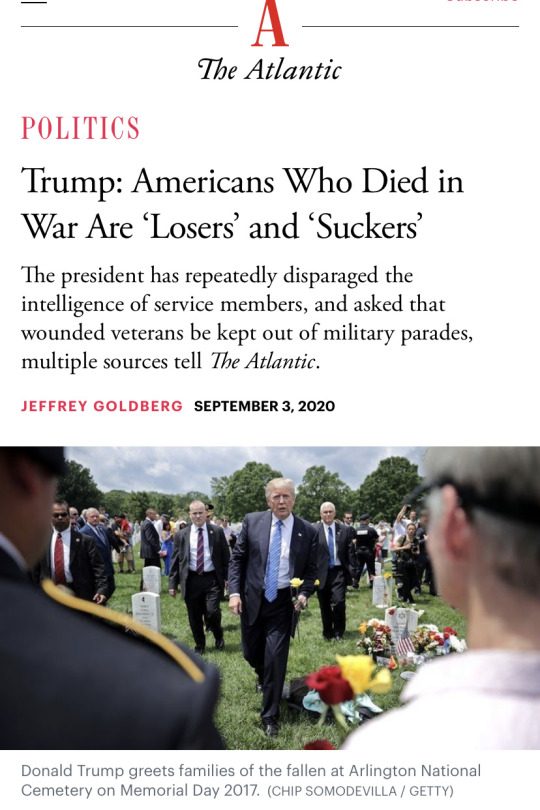
When President Donald Trump canceled a visit to the Aisne-Marne American Cemetery near Paris in 2018, he blamed rain for the last-minute decision, saying that “the helicopter couldn’t fly” and that the Secret Service wouldn’t drive him there. Neither claim was true.
Trump rejected the idea of the visit because he feared his hair would become disheveled in the rain, and because he did not believe it important to honor American war dead, according to four people with firsthand knowledge of the discussion that day. In a conversation with senior staff members on the morning of the scheduled visit, Trump said, “Why should I go to that cemetery? It’s filled with losers.” In a separate conversation on the same trip, Trump referred to the more than 1,800 marines who lost their lives at Belleau Wood as “suckers” for getting killed.
Belleau Wood is a consequential battle in American history, and the ground on which it was fought is venerated by the Marine Corps. America and its allies stopped the German advance toward Paris there in the spring of 1918. But Trump, on that same trip, asked aides, “Who were the good guys in this war?” He also said that he didn’t understand why the United States would intervene on the side of the Allies.
Trump’s understanding of concepts such as patriotism, service, and sacrifice has interested me since he expressed contempt for the war record of the late Senator John McCain, who spent more than five years as a prisoner of the North Vietnamese. “He’s not a war hero,” Trump said in 2015 while running for the Republican nomination for president. “I like people who weren’t captured.”
There was no precedent in American politics for the expression of this sort of contempt, but the performatively patriotic Trump did no damage to his candidacy by attacking McCain in this manner. Nor did he set his campaign back by attacking the parents of Humayun Khan, an Army captain who was killed in Iraq in 2004.
Trump remained fixated on McCain, one of the few prominent Republicans to continue criticizing him after he won the nomination. When McCain died, in August 2018, Trump told his senior staff, according to three sources with direct knowledge of this event, “We’re not going to support that loser’s funeral,” and he became furious, according to witnesses, when he saw flags lowered to half-staff. “What the fuck are we doing that for? Guy was a fucking loser,” the president told aides. Trump was not invited to McCain’s funeral. (These sources, and others quoted in this article, spoke on condition of anonymity. The White House did not return earlier calls for comment, but Alyssa Farah, a White House spokesperson, emailed me this statement shortly after this story was posted: “This report is false. President Trump holds the military in the highest regard. He’s demonstrated his commitment to them at every turn: delivering on his promise to give our troops a much needed pay raise, increasing military spending, signing critical veterans reforms, and supporting military spouses. This has no basis in fact.”)
Trump’s understanding of heroism has not evolved since he became president. According to sources with knowledge of the president’s views, he seems to genuinely not understand why Americans treat former prisoners of war with respect. Nor does he understand why pilots who are shot down in combat are honored by the military. On at least two occasions since becoming president, according to three sources with direct knowledge of his views, Trump referred to former President George H. W. Bush as a “loser” for being shot down by the Japanese as a Navy pilot in World War II. (Bush escaped capture, but eight other men shot down during the same mission were caught, tortured, and executed by Japanese soldiers.)
When lashing out at critics, Trump often reaches for illogical and corrosive insults, and members of the Bush family have publicly opposed him. But his cynicism about service and heroism extends even to the World War I dead buried outside Paris—people who were killed more than a quarter century before he was born. Trump finds the notion of military service difficult to understand, and the idea of volunteering to serve especially incomprehensible. (The president did not serve in the military; he received a medical deferment from the draft during the Vietnam War because of the alleged presence of bone spurs in his feet. In the 1990s, Trump said his efforts to avoid contracting sexually transmitted diseases constituted his “personal Vietnam.”)
On Memorial Day 2017, Trump visited Arlington National Cemetery, a short drive from the White House. He was accompanied on this visit by John Kelly, who was then the secretary of homeland security, and who would, a short time later, be named the White House chief of staff. The two men were set to visit Section 60, the 14-acre area of the cemetery that is the burial ground for those killed in America’s most recent wars. Kelly’s son Robert is buried in Section 60. A first lieutenant in the Marine Corps, Robert Kelly was killed in 2010 in Afghanistan. He was 29. Trump was meant, on this visit, to join John Kelly in paying respects at his son’s grave, and to comfort the families of other fallen service members. But according to sources with knowledge of this visit, Trump, while standing by Robert Kelly’s grave, turned directly to his father and said, “I don’t get it. What was in it for them?” Kelly (who declined to comment for this story) initially believed, people close to him said, that Trump was making a ham-handed reference to the selflessness of America’s all-volunteer force. But later he came to realize that Trump simply does not understand non-transactional life choices.
“He can’t fathom the idea of doing something for someone other than himself,” one of Kelly’s friends, a retired four-star general, told me. “He just thinks that anyone who does anything when there’s no direct personal gain to be had is a sucker. There’s no money in serving the nation.” Kelly’s friend went on to say, “Trump can’t imagine anyone else’s pain. That’s why he would say this to the father of a fallen marine on Memorial Day in the cemetery where he’s buried.”
I’ve asked numerous general officers over the past year for their analysis of Trump’s seeming contempt for military service. They offer a number of explanations. Some of his cynicism is rooted in frustration, they say. Trump, unlike previous presidents, tends to believe that the military, like other departments of the federal government, is beholden only to him, and not the Constitution. Many senior officers have expressed worry about Trump’s understanding of the rules governing the use of the armed forces. This issue came to a head in early June, during demonstrations in Washington, D.C., in response to police killings of Black people. James Mattis, the retired Marine general and former secretary of defense, lambasted Trump at the time for ordering law-enforcement officers to forcibly clear protesters from Lafayette Square, and for using soldiers as props: “When I joined the military, some 50 years ago, I swore an oath to support and defend the Constitution,” Mattis wrote. “Never did I dream that troops taking that same oath would be ordered under any circumstance to violate the Constitutional rights of their fellow citizens—much less to provide a bizarre photo op for the elected commander-in-chief, with military leadership standing alongside.”
Another explanation is more quotidian, and aligns with a broader understanding of Trump’s material-focused worldview. The president believes that nothing is worth doing without the promise of monetary payback, and that talented people who don’t pursue riches are “losers.” (According to eyewitnesses, after a White House briefing given by the then-chairman of the Joint Chiefs of Staff, General Joe Dunford, Trump turned to aides and said, “That guy is smart. Why did he join the military?”)
Yet another, related, explanation concerns what appears to be Trump’s pathological fear of appearing to look like a “sucker” himself. His capacious definition of sucker includes those who lose their lives in service to their country, as well as those who are taken prisoner, or are wounded in battle. “He has a lot of fear,” one officer with firsthand knowledge of Trump’s views said. “He doesn’t see the heroism in fighting.” Several observers told me that Trump is deeply anxious about dying or being disfigured, and this worry manifests itself as disgust for those who have suffered. Trump recently claimed that he has received the bodies of slain service members “many, many” times, but in fact he has traveled to Dover Air Force Base, the transfer point for the remains of fallen service members, only four times since becoming president. In another incident, Trump falsely claimed that he had called “virtually all” of the families of service members who had died during his term, then began rush-shipping condolence letters when families said the president was not telling the truth.
Trump has been, for the duration of his presidency, fixated on staging military parades, but only of a certain sort. In a 2018 White House planning meeting for such an event, Trump asked his staff not to include wounded veterans, on grounds that spectators would feel uncomfortable in the presence of amputees. “Nobody wants to see that,” he said.
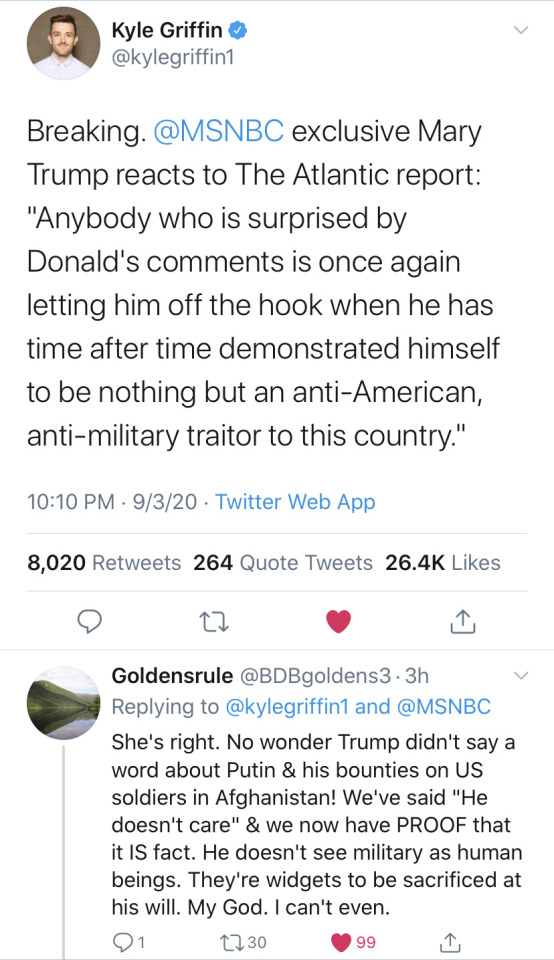
48 notes
·
View notes
Note
five times kissed
Send “Five Times Kissed” for a drabble of – YOU GUESSED IT – 5 times our muses kissed | @ghoststorytm | Always Accepting (but slow)
1)
It’s an accident.
He and Bucky are sharing a bed because Steve would likely freeze to death otherwise. The bitter cold of a Brooklyn January night shows no bias, nor mercy, after all. It’s almost like they’re kids again; nudging one another, and accusing the other in hushed tones of being a bed hog. Bucky complains that Steve has an unfair advantage, what with those daggers he’s got for elbows.
Steve gets him in the ribs for that remark, and shortly after, the two settle down.
There is no quiet to be had, of course. Between the neighbor’s below, who can’t seem to decide if they’d rather be arguing or…Well, making up – and the wildlife outside of their apartment insistent on rummaging through the day’s trash, Steve is regrettably quite awake.
Bucky has long since drifted off into a peaceful slumber, and exactly how he manages to do so consistently is beyond Rogers’ understanding. He’d be envious if he weren’t already overcome with too many other, more persistent emotions. Mainly the overwhelming urge to kiss the soft-looking, slightly parted mouth now mere inches from his own.
It’s an accident. One minute he’s staring (and vehemently reminding himself that he can’t do this – and shouldn’t want to in the first place), and the next…He’s leaning in, lips quivering, and presses the most chaste of kisses to that whiskey-flavored mouth.
He regrets it immediately; tears away from his best friend, and slips out of the bed as quickly as possible without alerting the other male to his departure.
Steve is in too big a rush to notice Bucky staring after him from the bed they had previously shared.
2)
He can’t forget that first time, no matter how hard he tries. It plagues him in both his waking, and unconscious hours. How many hours of sleep has he been robbed of now, tormented by visions, and phantom sensations of lips and hands that he has no right to desire? Too many to count.
Steve is grateful that his friend was unaware of his moment of…What? Delusion? Weakness? He’s wracked his brain countless times, attempting to make sense of just what compelled him to follow through with such a disgusting desire. To take advantage of a friend like that is unforgivable.
Drinking is expensive, and dangerous for a man of his slight build (not to mention less than fantastic medical background), but Steve indulges tonight because he’s not sure he’d be able to bear watching Bucky dance with both their dates, otherwise. There’s a pretty blonde, petite, with a cherry-colored mouth getting twirled around the dancefloor before she’s pulled back in closer to Bucky than Steve could ever be. It’s so intimate, he can hardly stomach it.
Or is it his own guilt and shame that has him feeling so nauseous?
Regardless, Steve decides that he’s had enough – enough booze; enough stale, smoke-filled air; and more than enough watching his best friend be the kind of guy that all ladies moon over.
He stumbles out into the crisp night air, pulling his jacket tighter around his bony frame, and starts toward home on unsteady legs.
Only a hand comes down on his shoulder, halting his progress before he even gets five paces away from the too-loud club. “Hey! Where are you running off to, punk? Leaving your date like that, she’s gonna-” Steve swats the hand away far too sharply. He knows that Bucky’s done nothing wrong to deserve such harsh treatment, but right now, Steve’s too drunk and angry to care.
“She’s got you, Barnes. Why the hell would she miss a guy like me?” The words are spat in Bucky’s direction, venomous and scathing.
There’s no time to register what’s going on; one second Steve is standing with his back to the other man, shoulders slumped and spine bowed, and the next, he’s gulping down air in a desperate attempt to fill his lungs after having the wind forced out of them. His back is against cool brick now, and Bucky’s staring down at him with eyes far too clear for a man that’s had as much to drink as he has.
“What?” Steve snaps again, feeling strangely exposed; as if Bucky can see right through to the fear and insecurity ravaging him inside.
Bucky’s leaning into him now, one hand propped against the brick on either side of Steve’s head, and for a moment, the blonde is sure he’s gonna get socked in the jaw for mouthing off. The punch he’s anticipating never comes, though. Instead, in the time it takes him to blink, there are lips slotted against his own.
It’s searing, sloppy, and short-lived; Steve pulling away, and nearly cracking his head against the brick behind him in the process.
Bucky seems just as shocked by his actions as Steve, if the look of horror that flashes across his face is anything to go by. The brunette staggers back silently, cupping a hand over his mouth before turning on his heel, and bolting out of the alley.
Steve doesn’t wait up after returning to their apartment to know whether or not Bucky returns that night; but he does wake to an empty bed the next morning.
3)
Bucky ships out, and Steve is left behind, because that’s “what God intended”, or some shit. He doesn’t care much for such an illogical line of reasoning; at the end of the day, he’s been turned away time and time again because his body isn’t strong enough to withstand the rigorous training required to fight a war, much less actively participate in one.
Then he meets one Dr. Abraham Erskine, and his life is completely changed. For the better, Steve would argue. After all, he’s made fast enough to chase down the man responsible for the good doctor’s death; strong enough to withstand bullets; and his myriad of debilitating physical ailments just…Cease to be.
It turns out that war isn’t all Steve thought it to be. At least, not when you’re America’s shiny, new golden boy. Being placed upon a pedestal is something he’s unaccustomed to, and he hates it, but he goes along with the shows because it keeps the troops motivated. Steve doesn’t want – has never wanted – to parade himself around a rickety stage with a group of (admittedly lovely, and almost too sweet) young ladies while the soldiers around him continually go out and risk their lives.
He wants to go out there, himself, fight alongside these men for the good of everyone back home, waiting for their loved ones to return, and ensure the safety of this country.
When he hears word that Bucky’s life is endangered, well, there’s no longer any doubt in Steve’s mind that he needs to be out there. With the help of Peggy, and Howard Stark, Steve is able to get back to his best friend.
Seeing Bucky strapped to a table is unnerving, but it’s a relief just to see that he’s alive. Steve gets him up, and the two men fight their way out of the Hydra base. It’s a completely irrational thought, but once they make it back, Steve thinks that this is what he’s always wanted; to be on level ground with Bucky, fight alongside him, and protect him.
Their return to camp is met with mixed emotions. Survivors are welcomed back with open arms, and relief, while they mourn those that were lost to Hydra’s hands. Sleep is elusive, though every man is exhausted to his very bones. Steve is no different, having chosen to stray a short ways from the camp to gaze up at the sky, and count the stars he can see clearly now, with his enhanced vision.
A hand touches the small of his back so lightly it’s damn near imperceptible, and the blonde jumps, twisting to face his would-be assailant. There’s Bucky, looking momentarily startled before he manages to collect himself enough to muster a small, crooked smile.
“Thought I told you not to do anything stupid, punk.”
Steve’s mouth goes dry. Seeing Bucky on that table, prone and lifeless, had been terrifying. And now, having the other man before him, alive and impossibly handsome, even with a bruised face and messy hair is too much.
Averting his gaze, Steve offers a lazy, one shouldered shrug in response. “Good to see you too, Bucky.”
The tension between them is thick enough you could cut it with a knife. This isn’t the way he envisioned their reunion going, and he hates it, hates that this feels almost like they’re two different people meeting for the first time.
Steve sighs, drags a hand back through his hair, and returns his attention to Bucky. “Listen, Buck, I’m-” He isn’t allowed to finish his sentence, however, as quivering hands grip him by the shoulders to draw him down, and into a kiss that’s equal parts uncertain and demanding.
It’s over as quickly as it’s begun, leaving Steve breathless and confused, and a little hurt as he’s made to watch Bucky’s retreating form make the walk back to camp with slumped shoulders.
4)
“You look like hell, Steve.”
Steve lifts his head so quickly he’s sure to have gotten whiplash. Standing there in the doorway of his cramped kitchen is none other than Bucky Barnes.
It’s not the Soldier that he’s grown accustomed to seeing in his apartment, sitting stationary for hours at a time, staring ahead at the television screen without really processing any of what’s being broadcast. But it’s not quite the James Buchanan Barnes that struggled to keep Steve out of trouble in seedy Brooklyn alleys, either. This is a man that’s looking to discover himself – whoever that may be – and just wants some fucking peace while he does it.
Steve can relate.
By the time he manages to pick his jaw up off the floor, his mouth has gone dry, and Bucky looks about ready to bolt.
“Yeah,” he rasps, the corners of his lips twitching with a smile he’s doing a poor job of concealing, “well, at least I own it.” That comment earns him a snort from the brunette darkening his doorway. It’s an oddly endearing sound.
Bucky doesn’t move from the kitchen doorway for the next hour, while the two talk, and banter. Steve knows better than to think this is like old times – he’s been down that road before, and it only ends in pain – but it does feel good not to be alone.
A companionable silence falls over the two men, and after upholding about half of that hour long chat himself, Steve is content to let it wash over him. Bucky, however, is clearly not. The brunette shifts his weight a little; averts his gaze to the front door, as if expecting someone to come charging in; and idly touches the metal plates of his arm.
“…We kissed.”
Steve is too dumbfounded by this sudden announcement to formulate a more eloquent response than a strangled noise, as he nearly chokes on his own spit.
“You and me…Before.” Before HYDRA. The words go unspoken, but they’re understood nonetheless.
Steve hesitates just a moment before nodding.
“I don’t remember much.” Bucky speaks slowly, brow furrowed, as if he’s waiting to be scolded for bringing it up in the first place. His gaze is piercing in spite of the uncertainty laced in every word. “Just…Sensation, mostly. Warmth. Your lips were chapped.” There’s a slight quirk to one corner of Bucky’s mouth as he says this; the beginnings of a crooked grin, unfortunately quickly smothered.
Again, Steve merely nods, though his own smile grows in response.
For the first time since the beginning of their conversation, Bucky fully enters the room. His steps are slow and measured, purposeful, as he closes the distance between Steve and himself. Once close enough, he outstretches the hand of flesh and bone, and curls fingers in dirty blonde hair.
“Can I…?”
The air is all but forced from Steve’s lungs by that simple question. “Yes.” It escapes his lips a prayer.
Bucky is careful, so careful, as he lowers himself to slot their mouths together. Slow, measured, and purposeful, much like his stride; and Steve drinks it in, taking all that Bucky is willing to give, until he’s drunk on it.
The two separate, mouths slick and kiss bitten red, and stare at each other until Bucky looks away.
“You ever heard of chapstick, Steve?”
Steve socks him in the shoulder for that one.
5)
Steve honestly never thought he would choose to hang up the suit and shield. In truth, he always suspected he would get himself killed first; no doubt his teammates thought the same. But in the end, it was the best decision he could have possibly made. Not only for himself, but for him.
The gorgeous brunette seated across the table from him now is smiling as Steve outstretches a hand to caress his knee under the table, and even allows a little huff of laughter to escape those plush lips of his.
“You’re a dog, Steve Rogers.” Bucky accuses, voice warm and low in a way that has Steve counting his lucky stars, because only he gets to see this side of Bucky; the soft, intimate, playful, teasing side that makes him fall in love all over again.
There’s a rumbling hum of affirmation from Steve, who makes no attempt to argue or defend himself, as he gives the other man’s knee another light squeeze before withdrawing. His heart’s racing, and his chest feels tight – dear God, it’s like he’s a 90 lb asthmatic again – and Steve worries that he may just pass out before he gets to this next part. It’s so important that this go well, because he wants to make it perfect – Bucky deserves perfect – but when does life ever make it so easy for them?
The two have been sitting at their little dining room table for the better part of an hour now, just talking and sipping idly at wine that neither man could get drunk off of if he tried. It’s been…Nice. Steve can’t remember the last time that he was able to just sit and talk with Bucky like this, without fear of some impending crisis dragging him away from it all.
There are so many things that he wants to say; so much to thank Bucky for; so much to apologize for, too. But that can come later. For now, there’s something far more pressing that he needs to get off his chest.
Rising from his chair, Steve watches, barely biting back his smile, as Bucky assumes that dinner is over and checks his phone. Normally, this is the point in the night that one of them collects the dishes and takes them over to the sink to be washed. But not tonight.
A small velvet box is drawn from his pocket as the blonde takes a knee by Bucky’s side. To his credit, Bucky does shift his attention from his phone, curiosity evident in the way his brows knit together as he peers in Steve’s direction. Lips part, likely prepared to question Steve’s odd behavior, before realization dawns. And oh, what a beautiful thing it is to witness the moment in which Bucky takes notice of the parcel in his lover’s hand. Shock melds into confusion, and into what Steve hopes to be elation.
“Steve, what the hell?” Bucky sounds as breathless as Steve feels, right about now.
After taking a deep breath to steady himself, the blonde speaks. “I’ve loved you since I first knew what love was, Bucky. I put you through hell, and yet you stuck around, refusing to leave my side like the stubborn jerk you are.” Mirth glimmers in baby blue eyes, and Steve feels his chest tremble with his next shaky inhale. “I’ve come to realize that home isn’t a city, or a time, or even a building – it’s you. You’re the home I wanna come back to, Bucky. So…With all of that being said, will you marry me?”
Bucky looks like he’s about ten seconds away from either kissing Steve senseless, or punching his lights out. Naturally, Steve has a preference, but he opts not to vocalize that – probably for the best, too.
Just as he’s certain that he’s about to be let down easy, Bucky surges forward and hugs him so tight, Steve fears he may black out before he gets his answer. “You stupid punk…Yes. Yes, okay? Yes, I’ll marry you.”
Steve is familiar with heart defects, seeing as how he lived with one for a good chunk of his life, ‘n all, and he’s pretty sure that his heart’s fit to burst right about now. Clinging to Bucky in return, he grins from ear to ear, pressing a series of kisses into the crown of the other male’s hair. “God, Buck, had me scared there for a minute.” He whispers, voice a weak and shaky thing, barely able to escape his throat. There’s laughter on the tail end of that statement, however, because he’s too damned giddy not to laugh.
He leans back, taking Bucky’s hand in his own, and slides the simple gold band down the length of his flesh index finger. “Beautiful.” Steve’s baby blues are transfixed on the other man’s face, tracing every curve, and committing the way he looks in this moment to memory. There’s no doubt in his mind that he’ll never see a sight so entrancing as Bucky Barnes looking back at him with the utmost love and adoration, and a gold wedding band on his finger.
“C’mere.” Bucky offers no room for argument, pulling Steve in, and claiming his mouth in a kiss that speaks volumes. It’s a kiss that neither man will forget, for the rest of their lives; a kiss to mark the beginning of their next chapter.
After all, they did promise…Til the end of the line.
#ghoststorytm#[ put under a read more because THIS IS TOO LONG ]#[ and I'm sorry it took me forever to get this done alfkjw;ohifes ]#[ I wanted it to be special cause Ilu ]
2 notes
·
View notes
Text
Reading Definitely Not Wednesday
Leviathan Wakes by James S.A. Corey. A space opera set in the relatively near future. Humans have colonized Mars and the asteroid belt, and a few scattered populations make due on the moons of planets further out. There is, however, no faster-than-light travel, no contact with any solar system beyond our own, no sentient AIs, and no aliens. A major theme of the book is the culture clash between those who live on Earth or Mars – the superpowers of this future – and those who live in the Belt, where mining is the preeminent economy and life is the hardscrabble sort where even water and oxygen have to be imported, never mind concepts like justice and equality. Different characters move from one place to the other or switch allegiances, but their origins are as baked in as we would regard ethnicity or nationality. As one character puts it, "A childhood spent in gravity shaped the way he saw things forever." Corey (who is actually two separate dudes writing under a penname) does a wonderful job of fleshing out the background worldbuilding. I loved references to fungal-culture whiskey, Bhangra as the default elevator muzak, hand gestures exaggerated to be seen through a spacesuit, and largely unintelligible localized slang (“Bomie vacuate like losing air,” the girl said with a chuckle. “Bang-head hops, kennis tu?” / “Ken,” Miller said. /“Now, all new bladeboys. Overhead. I’m out.”). It feels like a more detailed world than a lot of sci-fi does. Which is good, because the characters are not all that compelling. The two POVs are Jim Holden and Detective Miller. Holden is the second-in-command on an unimportant spaceship that works as a freight hauler, moving ice back and forth between the Belt and Saturn. Things change dramatically when a mysterious someone attacks their ship and kills everyone except for Holden and a few others, and he finds himself centrally involved in the runup to war. He has the most generic action-movie-hero personality I can imagine, with no discernable characteristics except 'idealistic' (and I really only know that because other people keep telling him he is), kinda nervous about being suddenly thrust into command but doing a good job, a womanizer (but see, it's okay because he just keeps genuinely falling in love with so many women!), and earnest. He's fine. He's not even objectionable, just incredibly boring. He comes with a crew of entirely indistinguishable followers that I couldn't keep straight, but that's all right because most of them get killed off so I no longer had to try to remember who was who. He also develops a romance that is 100% unbelievable, but I suppose that's what action-movie-heroes do, so who's even surprised. Miller is a detective on Ceres, the largest city in the Belt, who's been hired by a rich family to track down their anarchist, slumming daughter. Miller is an incredibly cliche noir protagonist - alcoholic, divorced, not as good as he used to be, cynical, a little bit corrupt but underneath it all he still remembers his good intentions – but at least that means he has more of a personality than Jim, even if it's a personality you've seen a thousand times before. On the other hand, Miller becomes obsessed with this dead/missing girl in a way that is painfully stereotypical Manic Pixie Dream Girl. Two things kept this from ruining Leviathan Wakes for me. One, Miller is at least somewhat self-aware about it: This was why he had searched for her. Julie had become the part of him that was capable of human feeling. The symbol of what he could have been if he hadn’t been this. There was no reason to think his imagined Julie had anything in common with the real woman. Meeting her would have been a disappointment for them both. And two, there's a twist near the end that allows Julie to finally have her own voice in the text, and not exist solely as Miller's imagined dependance on her. It takes almost half the book for Miller and Holden to finally cross paths, at which point the missing-girl mystery and the war plot combine and take a twist for a direction I DID NOT SEE COMING. I am ambivalent on whether to spoil this; on the one hand, I read it unprepared and it was incredibly awesome to experience it that way. On the other hand, I suspect this is information that will be a determining factor for many people on whether they want to read it or not. So: halfway through, Leviathan Wakes takes a wild jump and becomes about a zombie outbreak. I would not have previously thought that 'space opera' and 'zombie apocalypse' are two genres that should be combined, but the tension and excitement skyrocket once the book takes this turn, transforming it from average quality to 'I CANNOT STOP READING, MUST FIND OUT WHAT HAPPENS NEXT'. So, good choice! The sequence with Miller and Holden trapped on a small space station trying to sneak their way past zombie hordes is one of the most thrilling I've read in ages. Leviathan Wakes is the first book in a series (apparently it was originally supposed to be a trilogy, but there's currently eight books out with at least one more planned, along with a batch of short stories) and has also become a show on the Syfy network that I haven't seen. I feel like I've spent a lot of this review complaining, but honestly I mostly enjoyed the book and am planning to read the sequels. The fact that people seem to like the characters from future books more than these ones certainly doesn't hurt! Pig/Pork: Archaeology, Zoology and Edibility by Pia Spry-Marques. A nonfiction book about everything remotely related to the farming and eating of pigs. I expected from the subtitle and the author's personal background that archaeology would be the main focus, but it turns out that's really only the first two chapters, which cover the Paleolithic hunting of wild boar and the original domestication of pigs. The other chapters turn to topics as diverse as experiments on feeding farmed pigs leftovers from restaurants, the spread of foot-and-mouth disease, a special Spanish ham called ibérico de bellota which can only be fed acorns, genetically modifiying pigs so their manure would contain less phosporus, sunburn in pigs, minature pet pigs, organ donation between humans and pigs, the terrifying tapeworms to be acquired from eating raw pork, why pork is a 'white' meat, how to make sausages, theories on why pork is neither halal nor kosher, the use of an enzyme from pig pancreases in wine production, EU food-safety regulations on traditional pork dishes, Cuba's 'Bay of Pigs', the Pig War between the US and Canada in 1859, and Oliver Cromwell's favorite pig breed. Basically if it has the remotest connection to the title, Spry-Marques has included it. She even includes recipes for each chapter, though some of them are clearly more for amusement than actual consumption – I can't imagine anyone having just finished a chapter on how eating raw pork will give you cysts in your brain is eager to try figatellu, a type of uncooked sausage from France. And it would take a braver foodie than me to taste "Asian-inspired pork uterus with green onion and ginger". In fact, as is probably not surprising for any book which touches on factory farming however briefly, you will probably come away not wanting to eat pork at all for a while. Spry-Marques's writing is breezy and conversational, which kept me turning the pages even when the structure was a bit scattered. I wish it were more focused, but it's a great book for anyone who enjoys popular science, history, or food writing. I read this as an ARC via NetGalley. Song of Blood & Stone by L. Penelope. A YA fantasy novel with some unusual elements. Rather than being set in vaguely medieval England or a dystopian sci-fi future, we're in a country where the technology seems to be around 1900: cars and electric lights exist, but they're restricted to rich cities, and someone coming from rural poverty might well have never seen either. Magic exists, but comes from one's heritage; you're either born with it or not. In Elsira, where our story is set, it's rare to the point of nonexistence. Our heroine Jasminda, however, does have magic, due to her father having been a refugee from the neighboring country of Lagrimar, where magic is common. Elsira and Lagrimar have been constantly at war for hundreds of years, but are separated by a magical Barrier which allows no one to pass through, except on rare occasions when a temporary breach happens and violence erupts. Elsirans are light-skinned and Lagrimari are dark-skinned, so Jasminda has dealt with fairly severe racism throughout her life. The story starts when Jasminda runs across Jack, a Elsiran soldier just back from spying in Lagrimar who has super important information that must get back to the capital as soon as possible; unfortunately Jack has just been shot and is closely pursued by a troop of Lagrimari soldiers. Jasminda and Jack team up, fall in love, and try to prevent the coming outbreak of war. The most revealing thing I can say about Song of Blood & Stone is that it's very, very YA. (As you could probably guess, what with its title that fits exactly into the pattern of the 'YA title' meme currently going around tumblr.) Almost everything that happens is easily predictable from the back cover (Jack's long-withheld backstory is clearly supposed to be a shocking twist, but it's obvious from the moment he appears), the prose is mediocre but fine, good and bad guys are clearly signalled, the real world parallels (racism, treatment of refugees, domestic abuse) are good-hearted but extremely Social Justice 101. On the plus side, the beginning was the worst part and it got better and better as it went along; several developments near the very end were so interesting that I'm tempted to read the sequel, despite my initial boredom. Overall it's not a bad book, but I'd only recommend it to people who are extremely affectionate of the most repetitive tropes of the YA genre. I read this as an ARC from a GoodReads giveaway.
[DW link for easier commenting]
4 notes
·
View notes
Text
ON TARGET: The Canadian Military is Not a Delivery Service
By Scott Taylor
Last week it was announced that the Canadian military has received formal orders to participate in planning the nationwide distribution of the COVID-19 vaccinations.
In an interview with the Canadian Press, Chief of Defence Staff, General Jonathan Vance admitted that long before the order was delivered the Canadian Armed Forces had been preparing for such an eventuality.
It was also announced that Major-General Dany Fortin will be commanding the Canadian military response team at National Defence Headquarters. Fortin’s most recent posting was in Iraq where he headed up the NATO mission to train Iraqi soldiers.
By all accounts, Fortin is a charismatic and extremely capable officer and at his initial press briefings he has proven to be very telegenic.
From a government public relations perspective this has been a very successful formula. The CAF has earned the trust and respect of the Canadian public to the point that simply handing over responsibility to the military and having an officer in uniform command the operation appeases our pandemic-fearing population.
The problem with this equation is that the military solution to vaccine distribution provides little in the way of actual resources. The challenge of rolling out vaccines across Canada is both logistical and medical.
The military does have an entire Logistics Branch and a truck fleet. However they have no where near the distribution capacity of existing private sector companies like Purolator, FedEx, UPS & DHL just to name a few.
The military also does not possess the specialized refrigeration equipment necessary to store and transport some of the vaccines.
It was reported that one asset the CAF could use would be its fleet of cargo aircraft – either the C-17 Globemasters or the C-130 Hercules – to rapidly deliver vaccines to Canada from either the U.S. or Europe.
One would think it would be far more efficient and cost effective to ship these vaccines using private sector airfreight companies. The aviation industry has been economically hard hit by the pandemic and using air force planes to deliver freight would only further exacerbate their lost revenue.
In terms of a medical challenge, one of the biggest concerns will be in determining who receives the vaccines first, and who in turn is to wait in line the longest.
Despite his sterling career and many martial accomplishments MGen Fortin does not have a doctorate of medical ethics on his resume. He is an artillery officer who commanded troops in Iraq.
Of course Fortin can add a civilian medical ethicist to his team but this is not currently a military profession. If Fortin is not a logistician nor a public health expert, other than disciplined leadership what exactly is he contributing to the vaccine distribution task force?
This observation should in no way be interpreted as slight to the capabilities of the men and women of the CAF and certainly not to Fortin personally. I have repeatedly said that in my opinion the CAF is not among the best militaries in the world – it is the best in the world.
What they are not is a delivery company with a nationwide distribution network.
I do believe the military will be able to assist in bringing the vaccination teams into remote regions and for this they are uniquely qualified and equipped. However we have to remember that such aid to the civil power, which has also included flood relief and fighting forest fires, is not the primary role of the CAF.
The CAF personnel are just as susceptible to the COVID-19 virus as the civilian population and their close proximity workspaces (ships, aircraft, barracks etc) means that any outbreak could spread through their ranks like a wildfire.
The raison d’etre of the CAF is to provide a combat force capable of defending Canada’s interests at home and abroad.
As much as it seems to reassure us to have a uniformed soldier handing out vaccines, it would make more sense if that same delivery were made by a guy in a Purolator jacket.
0 notes
Link
The president has repeatedly disparaged the intelligence of service members, and asked that wounded veterans be kept out of military parades, multiple sources tell The Atlantic.
Jeffrey Goldberg 5:32 PM ET
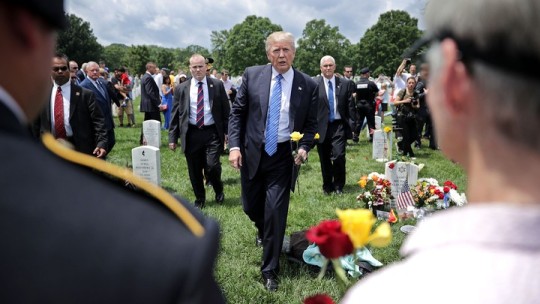
Donald Trump greets families of the fallen at Arlington National Cemetery on Memorial Day 2017.Chip Somodevilla / Getty
When President Donald Trump canceled a visit to the Aisne-Marne American Cemetery near Paris in 2018, he blamed rain for the last-minute decision, saying that “the helicopter couldn’t fly” and that the Secret Service wouldn’t drive him there. Neither claim was true.
Trump rejected the idea of the visit because he feared his hair would become disheveled in the rain, and because he did not believe it important to honor American war dead, according to four people with firsthand knowledge of the discussion that day. In a conversation with senior staff members on the morning of the scheduled visit, Trump said, “Why should I go to that cemetery? It’s filled with losers.” In a separate conversation on the same trip, Trump referred to the more than 1,800 marines who lost their lives at Belleau Wood as “suckers” for getting killed.
Belleau Wood is a consequential battle in American history, and the ground on which it was fought is venerated by the Marine Corps. America and its allies stopped the German advance toward Paris there in the spring of 1918. But Trump, on that same trip, asked aides, “Who were the good guys in this war?” He also said that he didn’t understand why the United States would intervene on the side of the Allies.
Trump’s understanding of concepts such as patriotism, service, and sacrifice have interested me since he expressed contempt for the war record of the late Senator John McCain, who spent more than five years as a prisoner of the North Vietnamese. “He’s not a war hero,” Trump said in 2015 while running for the Republican nomination for president. “I like people who weren’t captured.”
There was no precedent in American politics for the expression of this sort of contempt, but the performatively patriotic Trump did no damage to his candidacy by attacking McCain in this manner. Nor did he set his campaign back by attacking the parents of Humayun Khan, an Army captain who was killed in Iraq in 2004.
Trump remained fixated on McCain, one of the few prominent Republicans to continue criticizing him after he won the nomination. When McCain died, in August 2018, Trump told his senior staff, according to three sources with direct knowledge of this event, “We’re not going to support that loser’s funeral,” and he became furious, according to witnesses, when he saw flags lowered to half-staff. “What the fuck are we doing that for? Guy was a fucking loser,” the president told aides. Trump was not invited to McCain’s funeral. (These sources, and others quoted in this article, spoke on condition of anonymity. The White House did not return earlier calls for comment, but Alyssa Farah, a White House spokesperson, emailed me this statement shortly after this story was posted: “This report is false. President Trump holds the military in the highest regard. He’s demonstrated his commitment to them at every turn: delivering on his promise to give our troops a much needed pay raise, increasing military spending, signing critical veterans reforms, and supporting military spouses. This has no basis in fact.”)
Trump’s understanding of heroism has not evolved since he became president. According to sources with knowledge of the president’s views, he seems to genuinely not understand why Americans treat former prisoners of war with respect. Nor does he understand why pilots who are shot down in combat are honored by the military. On at least two occasions since becoming president, according to three sources with direct knowledge of his views, Trump referred to former President George H. W. Bush as a “loser” for being shot down by the Japanese as a Navy pilot in World War II. (Bush escaped capture, but eight other men shot down during the same mission were caught, tortured, and executed by Japanese soldiers.)
When lashing out at critics, Trump often reaches for illogical and corrosive insults, and members of the Bush family have publicly opposed him. But his cynicism about service and heroism extends even to the World War I dead buried outside Paris—people who were killed more than a quarter century before he was born. Trump finds the notion of military service difficult to understand, and the idea of volunteering to serve especially incomprehensible. (The president did not serve in the military; he received a medical deferment from the draft during the Vietnam War because of the alleged presence of bone spurs in his feet. In the 1990s, Trump said his efforts to avoid contracting sexually transmitted diseases constituted his “personal Vietnam.”)
On Memorial Day 2017, Trump visited Arlington National Cemetery, a short drive from the White House. He was accompanied on this visit by John Kelly, who was then the secretary of homeland security, and who would, a short time later, be named the White House chief of staff. The two men were set to visit Section 60, the 14-acre area of the cemetery that is the burial ground for those killed in America’s most recent wars. Kelly’s son Robert is buried in Section 60. A first lieutenant in the Marine Corps, Robert Kelly was killed in 2010 in Afghanistan. He was 29. Trump was meant, on this visit, to join John Kelly in paying respects at his son’s grave, and to comfort the families of other fallen service members. But according to sources with knowledge of this visit, Trump, while standing by Robert Kelly’s grave, turned directly to his father and said, “I don’t get it. What was in it for them?” Kelly (who declined to comment for this story) initially believed, people close to him said, that Trump was making a ham-handed reference to the selflessness of America’s all-volunteer force. But later he came to realize that Trump simply does not understand non-transactional life choices.
“He can’t fathom the idea of doing something for someone other than himself,” one of Kelly’s friends, a retired four-star general, told me. “He just thinks that anyone who does anything when there’s no direct personal gain to be had is a sucker. There’s no money in serving the nation.” Kelly’s friend went on to say, “Trump can’t imagine anyone else’s pain. That’s why he would say this to the father of a fallen marine on Memorial Day in the cemetery where he’s buried.”
I’ve asked numerous general officers over the past year for their analysis of Trump’s seeming contempt for military service. They offer a number of explanations. Some of his cynicism is rooted in frustration, they say. Trump, unlike previous presidents, tends to believe that the military, like other departments of the federal government, is beholden only to him, and not the Constitution. Many senior officers have expressed worry about Trump’s understanding of the rules governing the use of the armed forces. This issue came to a head in early June, during demonstrations in Washington, D.C., in response to police killings of Black people. James Mattis, the retired Marine general and former secretary of defense, lambasted Trump at the time for ordering law-enforcement officers to forcibly clear protesters from Lafayette Square, and for using soldiers as props: “When I joined the military, some 50 years ago, I swore an oath to support and defend the Constitution,” Mattis wrote. “Never did I dream that troops taking that same oath would be ordered under any circumstance to violate the Constitutional rights of their fellow citizens—much less to provide a bizarre photo op for the elected commander-in-chief, with military leadership standing alongside.”
Another explanation is more quotidian, and aligns with a broader understanding of Trump’s material-focused worldview. The president believes that nothing is worth doing without the promise of monetary payback, and that talented people who don’t pursue riches are “losers.” (According to eyewitnesses, after a White House briefing given by the then-chairman of the Joint Chiefs of Staff, General Joe Dunford, Trump turned to aides and said, “That guy is smart. Why did he join the military?”)
Yet another, related, explanation concerns what appears to be Trump’s pathological fear of appearing to look like a “sucker” himself. His capacious definition of sucker includes those who lose their lives in service to their country, as well as those who are taken prisoner, or are wounded in battle. “He has a lot of fear,” one officer with firsthand knowledge of Trump’s views said. “He doesn’t see the heroism in fighting.” Several observers told me that Trump is deeply anxious about dying or being disfigured, and this worry manifests itself as disgust for those who have suffered. Trump recently claimed that he has received the bodies of slain service members “many, many” times, but in fact he has traveled to Dover Air Force Base, the transfer point for the remains of fallen service members, only four times since becoming president. In another incident, Trump falsely claimed that he had called “virtually all” of the families of service members who had died during his term, then began rush-shipping condolence letters when families said the president was not telling the truth.
Trump has been, for the duration of his presidency, fixated on staging military parades, but only of a certain sort. In a 2018 White House planning meeting for such an event, Trump asked his staff not to include wounded veterans, on grounds that spectators would feel uncomfortable in the presence of amputees. “Nobody wants to see that,” he said.
Trump: Americans Who Died in War Are ‘Losers’ and ‘Suckers’
0 notes
Text
The Master (2012) | Written and Directed by Paul Thomas Anderson
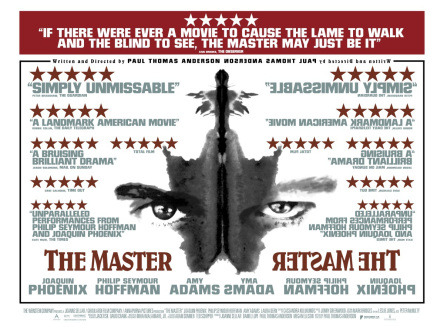
youtube
Intro and Technical Details
I try to figure out why I gravitate to certain films. Most of the time, it’s after someone asks me what my favorites are. I tell them, and then 90% of the time they don’t understand why I like those particular films. I’ve asked myself if it’s just some kind of wanna-be elitist, cinephile phoniness or something...but that’s not it. The reason I love films like The Master is due to their elusiveness. The Master shows you an approximate direction, but doesn’t overtly tell you what the answer is. In my eyes, this places it in a special category of cinema which is mysterious and often transcendent. It has something profound to say about us as humans and morphs with each viewing. It is alive because it doesn’t spoon-feed you an agenda or proposed concrete “truth” or “moral lesson”. My goal in this post is to take what I know and implement my personal thoughts and film knowledge to try to gain a better understanding of what this film is. This is my third post analyzing a film of my choosing. The first was about two women (Persona), the second was about a man and a woman (Cold War) and The Master is about two men. When people ask me what my favorite movie is, I tell them The Master by Paul Thomas Anderson. This is also PTA’s favorite film of his own. I remember the first time I watched it was at the NoHo Laemlle Theater a couple of blocks from where I live, right off of Magnolia, which happens to be the title of the first Paul Thomas Anderson film I ever watched. But while watching The Master that day in the theater, I remember feeling lost and dumb. I knew A LOT was happening but I didn’t know what. It left me behind. As a short filmmaker, when I first started (around the time The Master came out) I would just have stuff in my films (images, sounds, lines, etc) that were superfluous and didn’t have any legitimate reason for existing. My intentions were good...I was trying to create an atmosphere, even though a lot of the attempted atmosphere didn’t connect to the story or the idea being examined. I think it’s because a lot of the movies I was watching during that time I didn’t understand. I didn’t know why the director was making the detailed choices he or she was making. I still don’t always know the reason, but I do have a better idea. I must’ve thought these choices were just there spontaneously or by accident...for style-sake maybe! I was just going along the ride without consciously considering the nuanced decisions the director or actors were making. And oddly enough, this particular film is about a cult called “The Cause” and every cult’s main philosophy-based objective (in some odd form or fashion) seems to be to awaken your consciousness to yourself and/or to reality. If one is a film lover, and is so inclined to dig into this film, I believe one must watch consciously to understand it and not just go on the ride. And at first glance, one might make the mistake of thinking there is no rhyme or reason for certain moments, but Anderson is a filmmaker that does a vast amount of research and is very aware of what he’s packing in there. A literary example (which is much more elusive) is Finnegan’s Wake by James Joyce. Many believe Joyce was just goofing around with words, but if you read Joseph Campbell’s Skeleton Key or do some independent research on each phrase and term (if you have 10 years), one will realize there is meaning within the puns and riddles and melding-words. Finnegan’s Wake is a circular book and I believe The Master is a circular film. Finnegan begins again and I believe Freddie begins again. Roger Ebert gave the film 2.5 out of 4 stars and I love the first two sentences of his review: “Paul Thomas Anderson’s "The Master" is fabulously well-acted and crafted, but when I reach for it, my hand closes on air. It has rich material and isn't clear what it thinks about it.” Of course, I disagree mostly. I agree that the material is rich, but I think it’s clear what it thinks about itself more than Ebert thinks...and I’ll elaborate on this opinion throughout this detailed post. The next sentence in the review (after the quote above) is about how the Dodd character is based on L. Ron Hubbard, the founder of Scientology, but how in the film there is no clear vision of what the cult is or what it becomes. I believe we see quite a bit of what it is and we see that it has expanded to England by the end of the film. The film never lays out the exact tenets of the cult in list form, but Dodd himself is making it up as he goes along and this is expressed multiple times in the film. I also believe enough is revealed to get a fairly good idea of the cult’s philosophy and the methods being used for “curing”. Also, in my opinion, I don’t think understanding “The Cause” is entirely relevant to what the film is trying to say. The film is mainly about the symbiotic relationship of the two main characters, Freddie and Lancaster. I rewatched There Will be Blood last night (Anderson’s film before The Master) and the thought came to me that you have to watch the expressions of the characters closely during these films and follow what’s happening inside of them. This seems so obvious to point out, and could definitely apply to any film-watching experience, but the acting in Anderson’s films is so strong and subtle one will be lost unless you watch the silent moments and what the faces show you. I'm really trying to pick the right words to express this...but you have to consciously tell yourself while watching (in your thoughts) what’s happening with these complex characters if you want to understand the transitions. I don’t think the camera movements are as important in The Master nor the lighting, but it’s the characters’ internal life expressed in their faces manifesting from their psychological states, needs and wants. Of course, Freddie’s gait is a big part of his character and various body language from the all the characters are important, but their faces tell you most of the story. Also, I believe some knowledge of Spiritualism is needed to bring to the table, but I don’t think it’s absolutely necessary to understand what the film is trying to say. But anyway, perhaps I’m over-explaining too soon. I was trying to figure out how movies like this get away from people (including me) and cause so much confusion. The last time I saw the film was about 6 months ago at The Egyptian Theatre in Hollywood where the premiere was in 2012. The screening I saw may have been the same 70mm print from the premiere, but I could be wrong. I just tend to think there’s not too many 70mm copies out there. The Master was the first fiction film in 16 years to be shot in 65mm and then 5mm is added for the audio track. I didn’t know for a long time the reason why such a big film stock made a difference, but apparently it’s because more information can fit on each frame, therefore it’s crisper and more details can be seen...which makes it epic and ambitious and a filmmaker is really swinging for the fences if they use this big stock! Anyway, there was quite a large crowd at the Egyptian and I remember laughing at a few spots where no one else was and kinda had to pull myself back. I also remember noticing a lot of things I hadn’t noticed before and I’m sure this will be the case when I rewatch it again for this post. Before getting into the film, I'd also like to mention I will probably come off as a bit of a fan boy in this excerpt. It is because I believe Paul Thomas Anderson is one of the best filmmakers in the world of the past 25 years and has much to teach in a field that I’m passionate about. Also, I believe The Master is a master-piece and there are new interpretations of depth and reference that I am still uncovering (or think I’m uncovering).

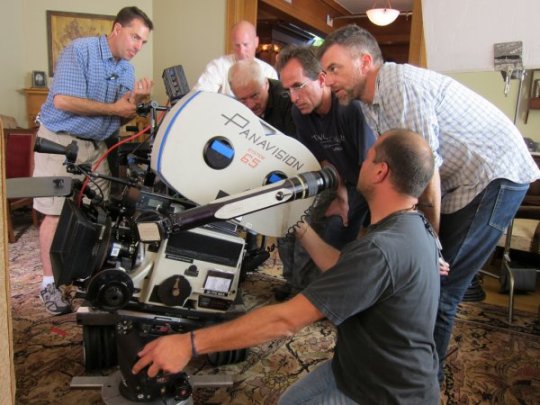
Freddie Quell, Navy Man at Sea
The opening shot is of aqua blue water behind the back of a ship, which is also the dominant color in the palette of the film and the color I think of when I think about the film. Johnny Greenwood’s score crashes in and then we see the first shot of Freddie Quell in a bunker with a military helmet on. I can’t remember where I read it but Paul Thomas Anderson told Joaquin Phoenix to mimic the monkey in the hot spring from the documentary Baraka for this shot, which also coincidentally was filmed in 65mm. I’m sure it's partly a nod to the film’s use of the same stock size, but I also think it's covertly setting us up for Freddie’s animal-like nature...or pointing to the animal-like nature of war and how this particular primate, Freddie, is expected to change his entire behavior, which is attempted by Lancaster Dodd throughout the film. Simplistically put, Freddie indulges in his animal nature. Dodd denies it. A dichotomy that will also act as a magnet between the two throughout the film and something that I will point out several times. Also, we wonder if war broke Freddie or was Freddie already broken? Or is he actually “broken” at all??


We immediately see that Freddie drinks heavily and how he is markedly different from the other soldiers in the group. He takes things too far and is much cruder than the others. He drunkenly simulates sex with the nude sand woman the guys have made and then masterbates into the ocean. He then lays down and closes his eyes next to the sand sculpture bosom, almost oedipal-like, sweetly spooning its side. This exact same image will pop up again and I believe it holds a large significance in the key to understanding the film.
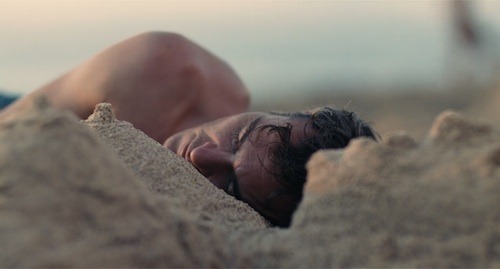
It is next revealed Freddie can make booze out of pretty much anything as he drains what looks to be the ship’s missile fuel into a cup. This also seems to be Freddie’s way of making friends with the other troops, as it is simultaneously announced that World War II is over. The camera scans the room and shows all the interesting yet shell-shocked faces of the troops as it’s explained to them by their superior they are now able to enter the world. They are told they can now open up their own businesses with the skills they’ve acquired. This doesn’t come off so much as anti-war, but obviously points out that a lot of these men are damaged psychologically, and the military either comes off as naive or willfully ignorant regarding the mental state of the guys entering the world post-service. This is magnified by a comical scene of Freddie sitting in a room with a hardened military psychologist who shows him rorschach blots as Freddie interprets every single one as extremely sexual. Phoenix is amazing in these closeups and the camera is able to hold on him for long periods of time. This was after his fake retirement from acting and I think he was hungry for this film. His face is gnarled with lines. He has this mumble that’s slightly distracting but makes you lean in as he moves in and out of the camera’s shallow depth of focus. This film has so many closeups and doesn’t include the long steadi-cam and dolly shots like in Boogie Nights or There Will be Blood. The comical scene is followed by a sad scene showing us that Freddie has some real psychological pain. He talks little and very uncomfortably to another military psychologist about his family and an old sweetheart. Freddie mumbles, “you can’t help me” and later sarcastically says, “thanks for the help”. Later on we wonder if Dodd gives him real help opposed to these psychologists.

Freddie Enters the World
Freddie has a job as a photographer in a department store. The portraits look lovely. The song underneath during this scene is perfect (”Get thee Behind Me, Satan” by Ella Fitzgerald).
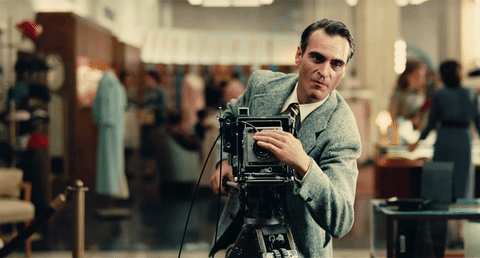


Freddie flirts with a woman that models clothes for customers. He later then mixes some of his potion in a photo-chemical room like an Alchemist. They both drink from the flask and then kiss. She shows him her breasts. Freddie asks her to go out that night, which cuts to Freddie passed out drunk at the restaurant table and the woman annoyed.
The next day Freddie is hung over at work and gets into a fight with a large male photo client. Freddie comically runs from the man and throws various items at him while dodging and weaving behind columns. The camera covers the commotion in wide shot in the department store so well! Then Freddie does something peculiar and funny by grabbing the hand of the model (his date from the night before) like he’s leaving the job and she’s coming with him. She looks at him baffled as they hurry out. Music comes in perfectly here (once again) with a jagged discontinuity of woodwinds which takes us to Freddie now working in a lettuce field in Salinas, California. The shift to this new, vastly different environment is dreamlike. Freddie continues to make booze and gives some to an older man that Freddie says looks like his father. The man gets ungodly drunk and Freddie is run out of the work group after being accused of poisoning the man, which leads to one of my favorite shots of the film. It is a long tracking shot of Freddie running through a foggy field away from the workers chasing him. I liked it so much I tried to slightly copy it while shooting a silly annual family short film in a cotton field in Texas, also running away from farmers. And worth mentioning (assuming my short film is worth mentioning), I remember reading somewhere that Paul Thomas Anderson read about the life of John Steinbeck (from Salinas, CA) and incorporated some of the stories in The Master.
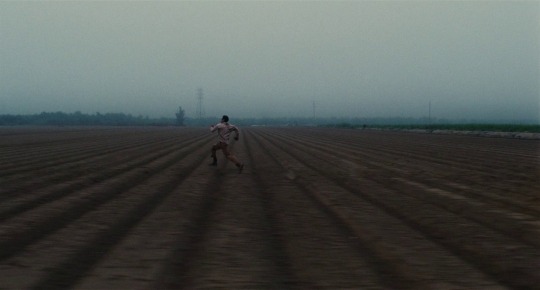
The Master (2012) Paul Thomas Anderson (Panavision 65mm)

The Jackel (2016) Cory Aycock (Canon 7D Crop Sensor)
Freddie Meets “The Cause”
Next, it cuts directly to Freddie walking on a dock, looking cold and dejected. In the distance is a boat docked with a lively party and warm lighting. Music plays and we get our first glimpse of Lancaster Dodd. He dances charismatically with his wife in the middle of an admiring group as Freddie, the misfit loner, decides to sneak onto the boat. The boat is then shown setting out to sea, which looks to be departing from San Francisco under the Bay Bridge.
The next morning, Freddie is hungover and has a humorous conversation with Lancaster, the leader of “The Cause”. Such a great opening scene with these two and Phillip Seymour Hoffman is so great in this role. I think it’s his best performance...but I’m biased. As mentioned, the conversation is humorous, but not funny-haha. Again, I will try to explain as best I can what I feel when watching some of these scenes... They talk in such a way, not necessarily about funny stuff, but they are such characters and there’s such chemistry it puts a smile on your face. You see the inner-game they are both playing and it’s delightful to watch. They are opposites, which creates this lively synthesis and makes you laugh sometimes, but also gives you such a large mindscape to enter during these rich, concentrated dialogue sessions. In this first conversation, Lancaster and Freddie both mention that the other seems familiar, which comes back later. Their association is sweet yet ridiculous at times. A likable naivety exists, but also a sense of intrigue and darkness lies underneath. Dodd tells Freddie, “I am a writer, a doctor, a nuclear physicist, a theoretical philosopher...but above all I am a man...A hopelessly inquisitive man, just like you.” And shortly after calls Freddie a scoundrel, but asks him to make more of his secret booze. A young Rami Malek, Clark, pops up next in the film and is marrying Lancaster’s daughter, Elizabeth. The first interaction we see between Hoffman and Malek feels like a Tom Cruise-like stareoff. Malek stares until Hoffman ducks his head in slight awkwardness. This trivial detail always catches my attention and I’m not sure why. Lancaster gives a speech after the ceremony in triangular blocking. This is my favorite speech of Dodd’s in the film. He is at his most charismatic and funny here, in my opinion, and touches on some of the philosophies of “The Cause” in symbolic terms. He talks about lassoing a dragon and then teaching it stay, then roll over and play dead. I’m almost positive this serves as a metaphor for taming the ego and/or reactionary mind, then learning how to navigate life playfully following this “enlightenment”. Freddie shifts in his drunkeness from confusion to laughter while continuing to compulsively drink all the alcohol in sight counter to the simultaneous speech.
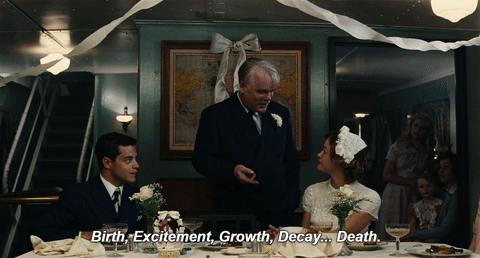
Although, Lancaster loves Freddie’s booze and, again, secretly asks for some after the speech. Freddie’s process of procuring this solution is somewhat like a mad alchemist and shown multiple times in the film. To me, this could metaphorically point to some type of alchemy forming between the two opposite characters considering the psychological and metaphysical tone of the film. It is also revealed the next morning by Amy Adams’ character, Peggy (Dodd’s wife), that Freddie inspires something in Dodd and he has been writing much more since Freddie showed up. Peggy has asked Freddie to sit with her at breakfast, possibly to see what it is about him that could possibly spark this insight in her husband. Despite this, I don’t think Peggy sees anything special in Freddie and doesn’t understand their relationship for the remainder of the film. Actually no one, besides maybe Elizabeth, sees anything worthy in Freddie at all other than Dodd. I believe this is because Freddie fills a unique gap within Dodd. I will expand on this more later, but to me it’s obvious Freddie is filling the gap of the id. Freddie is a scoundrel, an open drunk, a philanderer and a wanderer. These are things Dodd isn’t. He forbids himself of being this and Freddie is counter to this persona of Dodd’s, who is a leader, married and always ON. He is relied upon by his followers, always maintaining his status as prophet for the cult...perhaps the superego. Soon it is revealed there are “processing” sessions occurring on the ship, recording “past lives”. Everything is being put on tape of what people are saying during these sessions. Freddie humorously navigates the ship during all of this. At one point he sits at a table and puts on some headphones and it’s Lancaster’s voice deliberately stating, “We are not animals.” “We are not a part of the animal kingdom.” Simultaneously, Freddie looks across the table at a young woman and passes her a dirty sexual note. She goes back to work as Freddie watches her. The sun behind him shines through the window and perfectly peaks behind Freddie’s head. This is what I meant at the beginning of the post...the film is showing you something regarding the ideas it is trying to express. In this moment it’s not necessarily just in the face of the character, but in what Dodd says in the headphones in direct opposition to Freddie’s sexual note and then the sun winking at us from behind. For some reason, it makes me cringe to analyze some of these moments... demystifying and deflating the “magic” of these details.
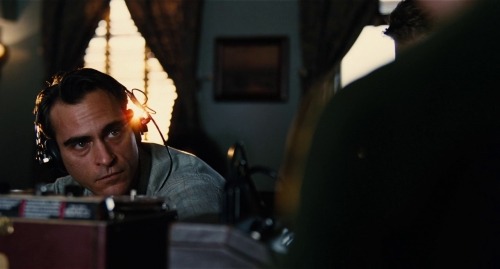
The distinction of “animal” pops up periodically a few more times in the film on the account of Dodd. Again, Freddie (the animal) and Lancaster (the divine) forming a fully whole being. Now, at the 36 minute mark, the best scene between two actors sitting across from each other at a table I’ve ever seen. It reminds me a bit of the scene in Persona where the two women sit across the table from one another when they meld. They also repeat the dialogue here like in Persona and Dodd dresses down Freddie similar to Alma’s dressing down of Elisabet. The face lighting in this scene is also similar, half-lighting the characters but in a dark Charlie Rose-like room directly counter to the white background in Persona. The scene begins by Freddie being processed after a drink with Lancaster. Lancaster asks him probing questions about his life and records it. The scene is funny, dark, raw and nuanced. I can’t say enough about this scene, there is so much here. Phoenix moves and looks around. Hoffman stays still, centered, not breaking eye contact. The first time around, Freddie doesn’t take it seriously and farts in the middle of them talking. Lancaster playfully calls him a “silly animal” and ends the processing session soon after by turning off the recorder. Freddie seems disappointed and wants to do it again. Lancaster sets up the rules this time and tells him he is not allowed to blink during the questioning. Freddie agrees. In somewhat Mesiner-like fashion they continue the exercise in a long closeup on Freddie. Phoenix is amazing here and at one points slaps his face multiple times after he blinks. They start over. Tears roll down his face. Apparently Freddie is severely troubled by his family past and recalls a sexual relationship he had with his Aunt. Then he reveals he was in love with a girl in his hometown named Dorris. It beautifully cuts from the black, heavy room to a bright sunny day and the white house where Dorris lives with colorful flowers in front. This is a beautiful contrasting cut by Anderson transporting us. Also, worth pointing out, is the contrast of how silly the scene started with farts and laughter, then taking us to this this deep, heavy pain within Freddie.
youtube
This is a unifying scene for Freddie and Lancaster. And despite what we think about the legitimacy of the cult, some type of deep psychological progress with Freddie is being made here...a progress that was not even close to being accomplished with the military psychologists. Or is this “progress”? Feels like it. As Freddie comes back from the flashback, it cuts to the aqua blue water again, similar to the opening shot of the film, perhaps personifying Freddie’s current mental state. The color of Freddie’s shirt also matches the color of the water.

Again, there is a charming naivety within Lancaster regarding “The Cause” during his far-fetched final questioning lightening the mood before the two have a drink and smoke a Kool together.
youtube
Funny outtakes at the end of the scene.
Obviously, Dodd is modeled after L. Ron Hubbard, but I don’t think it's a nasty rebuke or hit piece, nor is it an exact replica. I read Anderson and Tom Cruise remained friends after Anderson showed it to him. If one thinks it’s mainly a film about Scientology then they are absolutely wrong. It’s evident Anderson loves these characters in spite of all their flaws and complications. Dodd remains a believer of his own philosophy throughout the film, which I think keeps him likable. You also believe throughout he wants to help Freddie, even though some of that motivation may be ego-based or material for his writing. He is misguided at times but cannot be broadly painted good or bad and does not come off as maliciously pumping out nonsense solely for monetary gain. You believe he believes.
Sea-Legs to Landlocked
The ship now arrives at New York City and the group attends a fancy party at a home. You get the feeling this new spiritual movement is in vogue. Freddie goes straight for the booze and also begins stealing random stuff around the house. Lancaster schmoozes, then is shown performing a processing exercise for a woman laying on the couch for the party crowd. This last time watching, I got the feeling Dodd was curious what she would say and that every session he conducts he secretly sees as an experiment, collecting more data for himself rather than having a fully realized philosophy or completed methodology.
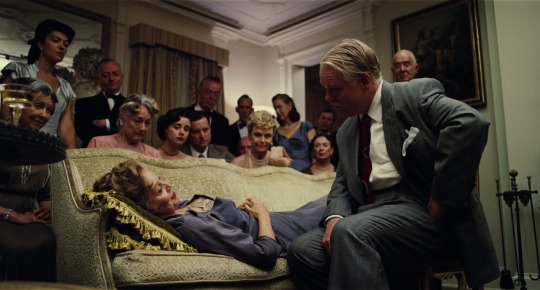
I’ve read Dianetics, so I do believe I have more insight into what’s going on in some of these scenes than a regular viewer. Although, I also believe the information is already there in the scenes if one pays close enough attention. And I’ll say it again, “The Cause” is not a carbon copy of Scientology. But, to generalize, the quest of both seems to be the same...to reach a state of “perfect” (or “clear”) by cutting through past traumatic memories and lifetimes (when the “analytic mind” was unconscious) in order to tame the current reactive mind. After processing, the woman on the couch talks about her past life and Dodd answers some of her questions. Then, a naysayer from the party verbally challenges the legitimacy of Dodd’s claims. "The Cause” is no longer confined to the vacuum chamber that is their boat. Dodd raises his voice in anger and Peggy looks visibly rattled as well. Lancaster eventually loses his cool after the naysayer continues to not back down and calls him a “Pigfuck”, which makes me laugh every time. This is the first time we see Dodd lose his composure in the film. Freddie is observing off to the side and throws a tomato at the guy, probably something Dodd wishes he could do. The party guest is obviously convinced there is no way to have a logical discussion regarding “The Cause” with Dodd and he’s right.
A quick aside and personal story...the actor playing the Party Guest Naysayer is named Christopher Evan Welch. I briefly worked backstage at the Mark Taper Forum in Downtown Los Angeles and Christopher was one of the actors in a play when I was working there. During one of the shows, while waiting for his time to go back on stage, he sat with me for a while and asked me questions about what I wanted to do in the business and where I was from, etc. I was still pretty green. I remembered him being very nice and authentic. This must have been around the time he worked on The Master because it was in early 2012. The next year I found out that he died suddenly of Cancer. Hoffman died not too long after. Very sad. The full scene is below with Welch and Hoffman:
youtube
Dodd and Peggy are upset now in their room after this fiasco. Dodd writes furiously as Peggy speaks, putting words to their anger, completely flabbergasted by this mild rebuke. The whole group is bent out of shape, shaken by this challenge. Freddie, next door, elects to take Rami Malek’s character (Clark) to the naysayer’s room to rough him up and they do (or Freddie does).
The next day Dodd pretends to scold Freddie, but it’s obvious he’s glad he did it. Again, Freddie being the id that is unrestrained and not held down by social convention in direct opposition to Dodd’s persona. This is where something similar comes in comparable to Scientology, because Scientologists are known to go after naysayers, sometimes aggressively. The group nows arrives at a large house in Philadelphia belonging to Laura Dern’s character, Helen. Everyone gets out of the car like a big happy family visiting relatives and you really feel the warmth of their community here. Different courses and talks are being held at the home. Dodd’s daughter, Elizabeth, makes a move on Freddie during one of the talks and Freddie resists. She is a redhead just like his past sweetheart Dorris. In the previous scene, Freddie was ready to go find the naysayer and Clark seemed apprehensive until Elizabeth gave him a look to go. She seems to like Freddie’s aggression. Plus, perhaps, her father’s closeness with Freddie has something to do with this attraction. There are moments when Freddie’s face, with all it’s interesting lines, drifts to another place and the sound completely fades as Anderson holds the shot on Phoenix in closeup. Anderson does tons of planning and research, but you get the feeling on the day during filming he’s constantly looking to catch moments of spontaneity and it seems this choice to hold on Phoenix during this particular moment is a good example.
Freddie continues to get completely wasted alone amongst the others, shown during a party as Lancaster sings and holds court. The scene afterwards always makes me laugh really hard (no pun intended) when Peggy jerks Lancaster off in the sink while making him agree not to drink anymore of Freddie’s booze. She continues to jerk and tells Lancaster if he’s going to cheat on her to not let her or anyone else she knows find out. Lancaster eventually comes and doubles over as he lets out a few violent pleasurable yelps. This is the closest to the animal side we see of Dodd, and this spirited release may point to the pressure build-up. Peggy then walks into the dark room where Freddie is passed out and tells him there will be no more boozing. He reluctantly agrees upon waking. Yet the next scene (the next day) shows Freddie continuing to drink heavily on the sneak. The Philadelphia Police show up at the house suddenly to arrest Dodd for running a medical school without a license. Dodd gives himself up relatively calmly and in contrast Freddie fights wildly with several police who violently wrestle him to the ground and handcuff him. Then there is a wonderful scene following, setting up the two protagonists’ contrast in temperament even more when Freddie is hauled in and put in the cell next to Dodd. Dodd is cooly standing still and calmly leaning on his bunk. Freddie is abruptly being dragged in by four officers, and immediately starts DESTROYING his cell as Dodd just observes. Dodd possibly feels this rage inside but has elected to consciously watch his rage rather than react as Freddie is. Then the two get in a hilarious, childish yelling match after Dodd tries to explain to Freddie why he is how he is. He tells Freddie the cause of his affliction is due to an implant from millions of years ago and that he is asleep (lining up with Scientology). Freddie isn’t having it and says he’s just making it all up as he goes along, echoing what Dodd’s son said to Freddie on the porch right before the police showed. Dodd yells back that no one likes Freddie except for him. Both of the characters have told each other a truth. Dodd then says he’s done with him and begins peeing in his cell toilet. Yet Freddie has no pot to piss in because he’s destroyed his cell, including his toilet. In fact, he may have also destroyed his relationship with Dodd, which would likely mean he will not have a pot to piss in for quite some time.

During a quick arraignment scene with Dodd, the Judge orders him to repay the $11,000 he took and gives him this look that has so much character and makes me smile every time. He cuts his eyes up in this humorously scolding way as he simultaneously hits the gavel. With these great films and directors and actors, you learn that even the smallest scene is packed with so much richness and detail and not wasted!
Dodd is now at the dinner table with his family. Freddie is still in jail. The family open up to Dodd voicing their concerns regarding Freddie. They want him gone. Dodd says they must try and help Freddie get well, perhaps Dodd trying to find a way to keep him around. Now a wide shot outside of the Philadelphia house. Dodd is sitting up on the porch with several others and there is a little girl on a tricycle in the foreground below the steps. Freddie sheepishly approaches the house after being let out of jail like the prodigal son. Dodd cooly embraces him. The little girl runs up the steps into the house. The two men then start wrestling like little boys in the yard, the two halves reconciled, laughing hysterically.

Freddie Quell, Patient of The Cause
Freddie is now being “treated” and/or administered tests in front of about 30 people in the house to “cure” him. Dodd tells him to go from one end of the room to the other, to feel the wood wall and describe it, then walk over to the glass window, feel it and describe it too. He continues this over and over.
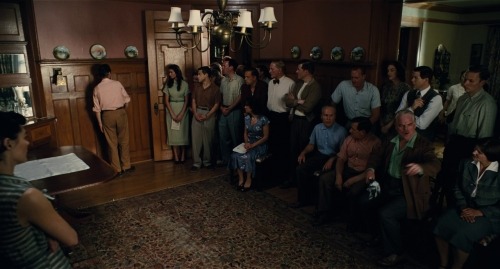
Paul Thomas Anderson is a filmmaker that walks in front of you and you have to catch up. He does this by overloading your mind with scenes that just start and don’t have a lead-up. You have to wait, then you find out. The strength of the music, cinematography and acting lays so much subtext in front of you, it can keep you from following what’s actually happening...which, oddly, I feel is part of what great cinema is. It’s a great distraction...a created atmosphere so thick that one can be swept away by it if they don’t watch out. For example, the first time I watched this film I thought I had an idea what was happening, then I realized I was wrong, but I had already overthought in the wrong direction so far I became completely lost and just sat there asking myself even more wrong questions in my head about what was going on until the credits rolled. I did the same thing in the same theater with Inherent Vice a few years later. In the next scene there is another exercise where Freddie sits across from Clark and is not to react to anything he says, including personal insults. He cannot react in any way (laugh or talk, etc) or Dodd will start over the exercise. This reminds me of the Synanon Cult and their ”Attack Therapy”. The cult used to be located in Santa Monica where the hotel Casa Del Mar is now and I’m sure Anderson had heard of them growing up in LA. Clark immediately says “Dorris” and Freddie breaks right away, looking to Dodd knowing Dodd told Clark to say this. Dodd replies, “Fail” and they have to start over. In my opinion (and I think I’m right) Dodd wants Freddie to get to a point of non-reactivity, possibly closer to a state of “clear”. All the individual’s insecurities are placed in the forefront consciousness (also why they record everything) and then the individual has to face these thoughts head-on until the past is dealt with and the former traumatic memories no longer abscond the self, opening the individual to infinity. The individual must face the shadow in other words, becoming whole by “mastering it”...taming the reactive mind or “dragon” as mentioned in Dodd’s speech at the wedding. Once the dragon is tamed then one can teach it to “roll over and play dead”. Am I being indoctrinated too??
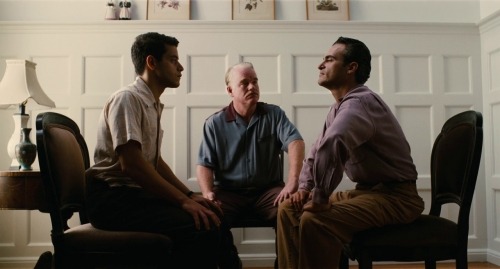
Next, Peggy reads Freddie sexually explicit passages from a book in a Demme-like closeup and Freddie is not supposed to react or say anything. Dodd excludes Freddie from eating lunch with the group and makes him stay inside the house continuing the exercises where he continually has to walk back and forth and feel the wood wall and window over and over again. Freddie is at a point now where he names the wall and window random things like “moss”, “rocks” and “barbed wire” as he touches them. My guess is this is an exercise to break down his sense of language....or just break down his mind, because it’s obvious to Dodd he needs to be broken down. I also think Dodd is using this as an experiment for his methods to see what “works”. He watches from outside as Freddie, alone, continues to walk back and forth. The camera pushes in on Dodd and his expression is one of curiosity as well as remorse, yet still barks out orders, “Back again!”.
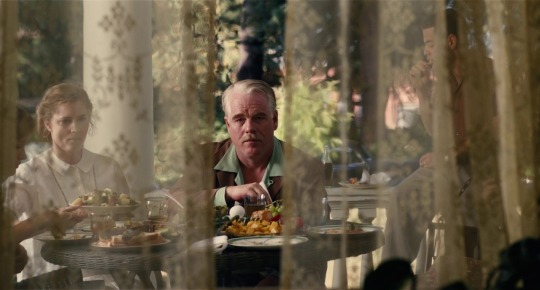
Shortly after, he explains to Freddie that it is a slow, hard process and Freddie looks mentally exhausted. But, eventually, Freddie starts making progress and is becoming stronger. Is it really working? Rami Malek (Clark) is so monotone and annoying here, it really shows Freddie has to be strong to take his insults during the exercises. Peggy even shows compassion for Freddie at one point, one of his biggest naysayers throughout the film. To shift to something technical for a second, I love how the flicker of the film looks in these closeups on Joaquin Phoenix! You can really notice it in the 4K Version. I also remember being very aware it was shot on film while watching the 70mm version at the Egyptian. I know it’s very cool to like film, but I really do authentically enjoy the look of it.
Freddie now does the wall/window exercise with manic energy. There is one moment when Joaquin Phoenix is jumping up and down and almost hits his head on the chandelier’s metal point...and it looks as though Hoffman gets out of character for a sec to block Phoenix’s head that narrowly misses it. Freddie is back feeling the wall like he has hundreds of times, then goes over to the glass again, feels it and deeply says he can touch the neighbor’s plants...the stars...anything he wants... This is not a big moment magnified by a music cue or closeup, but Dodd says enthusiastically “End of application!” Freddie has succeeded in completing the exercise. Perhaps Freddie has now transcended and touched infinity in Dodd’s opinion, realizing he can touch anything he wants (mental freedom), seeing the infinitude in something simple and ordinary like a glass window. Perhaps he has gone through the iterations of the exercises enough to become “clear” (the word “clear” is never used in the film). Dark, foreboding music now comes in during a shared hug between Lancaster and Freddie. In my opinion, the music foretells the bleakness of certainty Freddie is 100% cured.
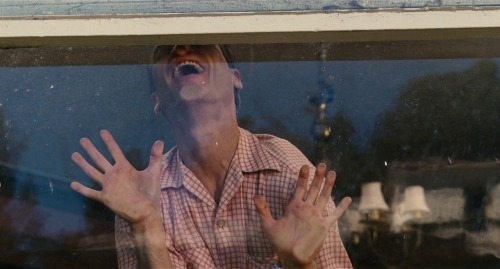
In the next scene, Peggy announces that Dodd’s new book will be presented in Phoenix, Arizona. After watching a few times, you realize that the work done with Freddie was most likely the catalyst for Dodd finishing the book after administering all the exercises. The film obviously doesn’t come out and say this directly, but we know Freddie has inspired Dodd’s writing, his son earlier revealed that Dodd is just making it up as he goes along and this announcement about a new book comes directly after Freddie “successfully” completes the tests. Also, is it a coincidence the city picked for the new book event is the last name of the actor playing Freddie, as well as the symbolic mythological bird that rises from the ashes after a rebirth?
Dodd and Freddie now are at a remote, desert location I assume is outside of Phoenix. They dig up Dodd’s unpublished work that had been buried. Lancaster carries a gun and looks around to make sure no one’s watching or, maybe, if a magic event might manifest. The score by Johnny Greenwood here is amazing. Again, with the two characters in this scene there is a wonderful naivety regardless of the ridiculousness of digging up this essential manuscript for “The Cause”. They are like two kid soldiers out in the great beyond full of wonder and purpose. And the shirt Dodd is wearing in this scene is hilarious.
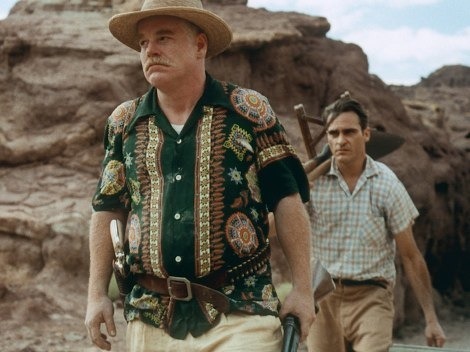
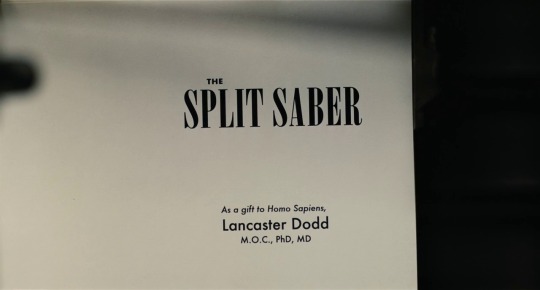
“The Split Saber” is printed on the press. Freddie takes pictures of Dodd, which are funny and sweet. I’ve included a pair of photos below that look to be influenced by photos taken of L. Ron Hubbard.
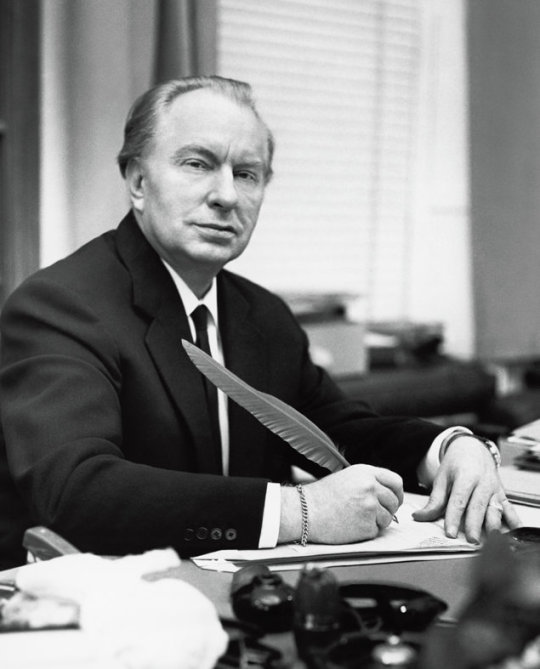
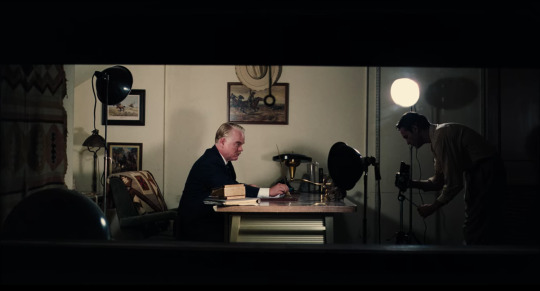
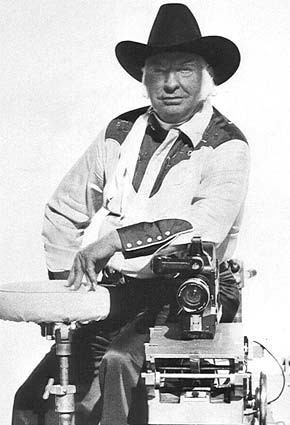
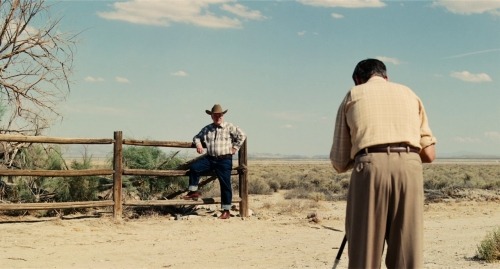
Everyone is gathered at the book event in Phoenix now. Dodd sits in a side room and is visibly nervous. There is a church vibe to the event. The Master (Dodd) comes out on stage to cheers from the crowd. Freddie sits in the middle listening intensely with a yearnful look on his face, perhaps hoping Dodd has a huge secret to reveal. Unfortunately, Dodd just basically says some of the same stuff he’s said before and Freddie looks let down. Anderson’s closeups on Phoenix in shallow depth of field continue to be revealing and look magnificent! Freddie paces afterwards behind the stage, looking lost, angry and confused. As you look at him, his pants, shirt and shoes are way too big. Maybe because he had to borrow some decent clothes from Dodd. Phoenix walks with Freddie’s unusual gait like a wounded clown. A friend of The Cause from New York, Bill, who we’ve seen before, reveals to Freddie he thinks the book stinks. Freddie asks Bill to go outside with him and just completely snaps and slaps Bill hard multiple times. There is something comical about this. It’s as if Freddie’s been holding this monster at bay and then just releases it all on poor ole Bill. Freddie has a history of lashing out at naysayers of The Cause but I don’t believe this is the main reason for the attack. I think Freddie now knows he is not “cured” or “clear” like previously thought. I think the lack of answers he felt he was going to get from Dodd’s speech and book pushed him to this, knowing deep down Dodd doesn’t have all the answers like he expected. In the following scene, Laura Dern’s character sweetly approaches Dodd sitting alone on stage after the event. She confronts him about something he has changed in the book regarding the processing and seems very confused. Dodd has a comically loud, insecure outburst displaying his lack of patience and also his unacceptance of criticism. Obviously, Freddie and Lancaster both simultaneously react harshly when The Cause is questioned despite the contrasting prior exercises practicing non-reactivity.
Freddie Runs
Now Freddie, Lancaster, Clark and Elizabeth drive a car and a motorcycle out to a deserted lake bed. On a personal note, I shot my latest short film’s biggest scene in a lake bed very similar...so similar I had to look it up online to see if it was the same one. It was not. Anyway, I remember in Roger Ebert’s review he seemed to be perplexed by this scene and what it represented. I just think Dodd decided it would be a good idea to get away and blow off some steam with a motorcycle after the stressful book event. I personally really like this scene. It’s funny, it’s visually interesting and there is a danger to it. Dodd explains the game is to pick a point and then drive the motorcycle to that point. Dodd does this first. Now it’s Freddie’s turn. Freddie takes off and speeds away. Dodd does this funny thing in closeup where he puts his hand up to block the sun, watching Freddie ride, then goes to say something, stops himself, then eventually ends up yelling, “Freddie!!” It’s something so small but Hoffman makes it so interesting and humorous and it’s hard to explain why. In my Short Film, I start my scene at this similar location with my hand up looking in the distance, as a nod to this scene with Hoffman (3rd photo).
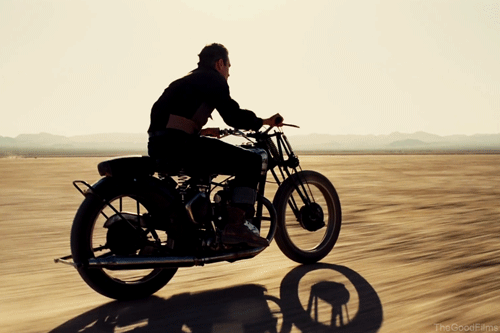
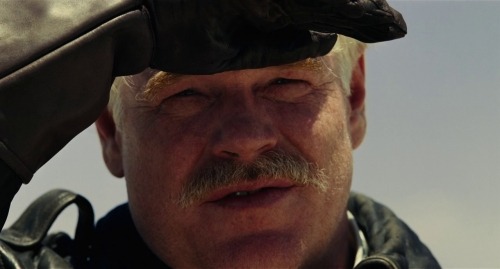

Freddie is long gone with the bike. Dodd’s best friend has left him. “No Other Love” by Joe Stafford comes in perfectly here. It’s such a melancholy end to the scene and I just feel the song compliments it so eloquently. It’s my favorite song of the film because of this and is in the trailer. Freddie goes to the house of the girl he loved before going to the war. He finds out Dorris is married now with kids and lives in Alabama. He finds this out by talking to Dorris’ mother. Freddie missed his shot. The scene is slightly comical due to the dichotomy between the sweet, mannerly mother and Freddie’s pressing roughness and gnarled face. It’s something I always notice and enjoy watching. We are transported now to Freddie asleep alone (most likely drunk) in a movie theater. You can hear Casper the Friendly Ghost in the background and see the flicker of the big screen on the sleeping Freddie and the empty seats around him. There has to be a reason for the choice of Casper the Ghost, but I have no interesting theory why. A theater concierge brings a phone to Freddie after waking him up. It’s Dodd. Either this is a supernatural moment in the film in which Dodd just happens to know where Freddie is (because they’re “tied”) or Freddie is being followed Scientology-style. Freddie nor us know how Dodd knew he was there. This made me think of an interview (somewhere) with PTA saying sometimes details in a film don’t have to make sense or have a definite answer. Dodd asks Freddie to come to England where he currently has a school. He says he misses Freddie and says he can cure him. My guess is he’s had someone find and follow Freddie...unless the Casper the Ghost reference somehow hints at the supernatural spiritual “tie” Dodd mentions between him and Freddie and Dodd just “knew” he was there...but my theory connecting this may be too far of a stretch.
On a Slow Boat to China...
Freddie is once again traveling on a boat, which has become a motif... Freddie adrift. We see the recognizable deep aqua water paired perfectly with Greenwood’s score. The music, once again, adds so much here, producing a sense of longing and beauty.

Freddie arrives at the school looking haggard and gaunt. Jesse Plemons’ character (Dodd’s son) greets him with a wry smile of familiarity which soon turns to concern after examining Freddie’s appearance. They walk down the burgeoning school hallway to Dodd.

Freddie enters with wild eyes to Dodd’s grand office. Peggy sits off to the side and Dodd at his desk. Freddie hands Dodd some Kool cigarettes and they hug. Peggy immediately asks Freddie if he’s drunk, says he looks sick and says he’s not interested in getting better. She storms out. The two men share a smile after she leaves, but Dodd’s hands are tied. It’s worth mentioning Amy Adams (as Peggy) was also nominated for an Oscar for her role and plays a sort of antagonist to Freddie. Dodd’s book was not well received by close peers and perhaps this was due to Freddie’s influence and she saw this, maybe encouraging Dodd to cut ties because of Freddie’s negative influence and lack of dedication to The Cause. You can see here Dodd loves Freddie very much. This is scene is so good! There is a lot of heart and power here in these closeups. Dodd loves Freddie’s freedom. Freddie depends on Dodd for structure and meaning and a place to stay. Dodd then says my favorite lines of the film, “For if you figure a way to live without serving a master...any master...then let the rest of us know, will you?” With the risk of over-explaining, I’ll dive in with my thoughts... Dodd seems to think everyone has a Master...an obligation, a social role and something transcending mammalian daily life to quench existential and spiritual need. But does Freddie have a Master? I think Dodd thinks if anyone might know how to live without one then it would be Freddie. Would this make Freddie “The Master” and not Dodd? Who is the prophet? Dodd calls him “a man navigating the seas, going wherever he pleases, paying no rent” and you realize Freddie’s steadfast gaze reveals a mastery of something...especially according to Dodd. The culmination here of bringing to consciousness the pair of opposites in character form proves to be the thesis of the film. This is not a film with a traditional story (perhaps that Ebert hoped to understand clearly) but a special situation between two men and how they fit together like puzzle pieces...two sides of the same coin...to the point where one might think it’s possible they did in fact know each another in a past life. Dodd mentions this upon meeting Freddie for the first time and Freddie agrees there is a mutual recognition. Two inverses folding into one another creating something whole, for better or worse. Dodd goes on to explain that he finally figured out where they met in a previous lifetime and says if they meet again in the next life they will be sworn enemies. Again, there is a lovely naivete here...and said with such earnestness. And as mentioned before, it is easy to like Dodd because you believe that he believes what he says, even though we, the audience, are speculative. Again, this is not a film about trying to figure out the legitimacy of a cult but about two men trying to navigate the world the best they can. Dodd goes into great detail about their past life association. In appearance, Dodd is so regal, reserved and groomed...so certain! Freddie is mangled, gaunt and lost. Dodd now begins to sing, which is funny and heart-breaking at the same time. It’s as if this is the best way he knows to express how he feels in the moment. I remember the first time I watched this film in the Laemlle Theatre and there were a few laughs here. I also remember watching this part when I was staying with my Dad and Stepmom one Christmas on HBO. I just flipped through the channels and saw this scene and stopped to watch. My Dad had never seen the film but watched this part with me and also chuckled a bit...not in a “that’s ridiculous” way, but in a concentrated way due to the intensity of Hoffman’s performance here. As the scene carries on, I again begin to wonder if these two really did meet in a previous life. Or maybe it’s just so powerful because they both BELIEVE this past life was real, believing in a pre-destined reason for their association in this lifetime.
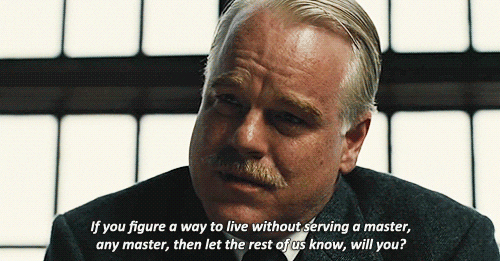
Freddie has now left Dodd. He is out of the office walking alone in a row of trees leaving the school. He goes to a bar, meets an English woman and they go to a room and have sex. Both are fully naked in a very human way lit in natural light. Two hominids in an animalistic act following the parting of Dodd who rejects the animal side for the fully divine. He playfully tells the woman he has to ask her some questions and she can’t blink. The processing scene is obviously still with Freddie and obviously PTA is aware of the power that scene held to call it back. She plays along for a little bit but laughs quickly and breaks. Now waltz music plays, circling back to Freddie on the beach where he was at at the beginning of the film, laying next to the sand woman in oedipal longing. Did he dream all of this?? I have watched the film around 10 times and have never thought about this as much as I have this time around. Of course, it’s ambiguous, but it could very well be true. And he did mention to Dodd in the England office he had a dream, but never got a chance to explain what the dream was. Dodd then went on to talk about their past life association. Anyway...the interpretation that I had come to previously was that Freddie has gone on this journey, but has ended right back where he started, meaning no amount of processing or methods to change his behavior can change his determinism. He is what he is. In fear of repeating this too much (which is never overtly stated in the film) humans cannot escape the fact that they are also of the animal kingdom. I believe the first shot of Freddie in the film mimicing the monkey introduces this idea. And Anderson doesn’t seem to care if the audience gets this first, coded, specific detail, but I believe there are enough clues throughout the film to make the animal comparisons to come to the same interpretation, as I’ve pointed out above multiple times to really bring my point home. Also, Freddie cannot escape how he may have suffered in the war, nor the trauma of his childhood, nor the loss of his sweetheart, Dorris, as he lays next to the breasts of the manufactured woman made of earth as the tide rolls in and out. This is still with him in his memories, shaping his present, whether he deals with it or not. And, more broadly speaking, perhaps all of this striving us humans engage in for self-mastery, and the constant modifications to ourselves to reach some pinnacle of “perfection”, we have built in our own minds is futile. We just go in this big circle, this journey and we end up right where we started. Are we “better”? Are we different? Are we “cured”? Maybe. Maybe not.

To conclude, I’d like to mention that I’ve discovered pre-determination has loomed large in all three films I’ve written about on this page. I’m not sure if it’s me or the films, but it has been the big picture idea I’ve come to on all three. It also makes me think how cinema itself is made possible, by showing and shaping a world, often overtaking the individual characters’ will. I believe this tells us something vital about our reality...cinema expressing transcendent ideas that can swallow up egoic identification, which is why films like this stick with you, pointing to something larger at play within the individual rather than solely the idea we have of ourselves.
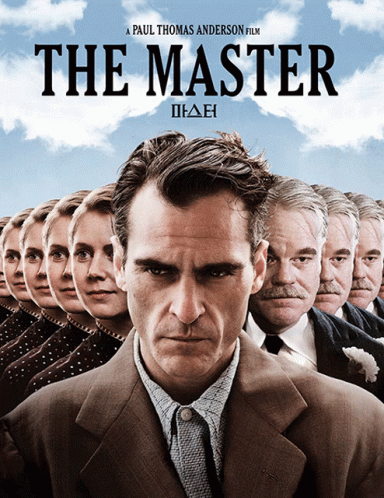
#the master#paul thomas anderson#phillip seymour hoffman#joaquin phoenix#70mm#film analysis#film essay#favorite film#cinema#citizen aycock
0 notes
Note
more obitine p l e a s e i want them to be happy (or at least not dead i'll take not dead)
Summary: This was supposed to be written a month ago, as a continuation of the Satine Lives AU that I wrote for a three-sentence fic prompt, but since I’ve been terribly busy, here we go. Set right after the end of ROTS (just corrected a typo there, I’d accidentally written ROTJ before), with everything the same except Satine’s continued existence.
(Also because, you know, anything in connection to Luke Kryze will always be awesome)
Characters: Obi-Wan Kenobi, Satine Kryze, Luke Skywalker, Ahsoka Tano (mentioned), Captain Rex (Mentioned)
Chapters: 1/1
I’ve cross posted this to ff.net!
The Question, Twenty Years Late
The war is over.
Satine stands alone on the palace balcony, and watches the afternoon sunlight glance off the glass towers of Sundari.
The people of Mandalore go about their ways in peace; Ahsoka, Rex, and their men have seen to that. Their last act as general and captain was to break the Siege of Mandalore, and return the system to Satine’s governance.
And then, in the midst of their post-battle laughter, came the order.
Satine remembers the minutes after the first declaration of order sixty-six with mind-numbing clarity.
There was confusion as the troopers not under Ahsoka’s direct command turned blasters towards her, and Ahsoka’s men reflexively raised theirs in return; there was blasterfire, and agonised screaming, one voice but from the mouths many men, brother, brother, why are you doing this-
Satine had wondered, later on, when Ahsoka and Rex and their surviving men have been rushed onto her fastest ship and sent blasting off into unknown space - whether her dream of two krayt dragons, brothers, tearing each other to pieces on black sand was truly simply a dream.
It had seemed too real.
Below Satine’s trembling feet, the palace walls are decorated with frescoes of dying Jedi, crushed under Mandalorian soldiers’ boots in millenia of war. And beyond this biodome, beyond Sundari, Mandalore is covered with dust ground from a billion soldiers’ bones.
The war is over, but at what cost?
Soon, Satine knows, the newly-self-declared emperor will send fresh troops to Mandalore, and ask for her sworn fealty.
It will fill her lips with gall to swear it; but she will have to. To do otherwise would be to condemn her people to extinction.
Her hands clench white and bloodless around the durasteel railing, and she fights the urge to lose her very insubstantial lunch over the balcony side.
Obi-Wan was on Utapau when it happened.
The holonet had been very vocal about his death.
She had not felt anything when she saw. She knew, in a way, that ten thousand Jedi had perished. That statistic, she could comprehend.
She could not, and cannot, comprehend Obi-Wan’s death.
The balcony doors slide open behind her, with hiss of compressed air. It sounds like the gasping breaths of a dying planet.
Satine closes her eyes against the afternoon sunlight, treacherous moisture prickling at her eyelashes, and waits for her attendant to announce the arrival of an Imperial Senate messenger, who will rip Mandalore from her like a child from her side.
But then, suddenly:
“Hello, there.”
Shock. Disbelief.
Satine turns in place.
Joy.
Utter, complete, rage-filled urge to slap the red-gold beard off that smirking face.
She stalks towards him, hands still clenched into fists, moisture that had welled in her eyes for another reason entirely suddenly breaking free into a torrent of furious tears. She might be snarling. She doesn’t care.
“Obi-Wan, you-”
He lifts calm, tired eyes to meet her tear-streaked gaze and says, with a little catch of humorous grief in his voice, “Shh, my dear, you’ll wake the baby.”
The-
Satine slides sharply to a stop, and stares at the little bundle in the crook of Obi-Wan’s arm.
“This is Luke,” Obi-Wan says, with that same strange lilt in his words. “My- my nephew.”
That raises many questions, but she does not voice them. Satine raises a finger, and brushes it along a pink cheek soft in slumber.
“Satine.” There is something new in Obi-Wan’s voice, now.
She looks at him, and reaches out gently to lower his hood. There is ash in his hair, and black sand speckled in his beard. His tunics, she notices for the first time, are scorched and worn. Her hands skitter over his cheekbones, his chin.
Obi-Wan smiles at her, a shadow of the cocksure grin that had stolen her heart across a campfire, almost two decades ago now, in the year of Mandalore’s civil war. “I’m not sure how to do this, and I’m probably doing it wrong,” he begins. “I know I’m supposed to have a ring, at least. I don’t. I’ve come to your doorstep with nothing but a scarred lightsaber and a baby.” His lips twitch, sardonically, as if realising the ridiculousness of that statement. “But if you’ll have me?”
That last sentence washes over Satine’s ears without entering them for a moment.
“You’re asking,” she says. It isn’t really a question.
“Yes,” Obi-Wan replies, gaze steady. “I’d kneel, but I’m holding Luke, so it would be somewhat awkward.”
“I…” Satine’s hands are frozen on Obi-Wan’s face.
“I once said I would have left the Order, had you said the word,” Obi-Wan murmurs, slipping a hand out from under Luke’s weight to clasp her hand where it rests on his cheekbone. “I know now why you did not - and I am asking a burden of you, to do this. I am asking you to raise a child not your own, and to marry a man who is a death sentence walking, for all the Empire’s intent. Forgive me for asking, but I think I have to.”
He falls silent with the air of a man awaiting either his pardon or his exile.
“What of attachment?” Satine says, softly.
“We were fools. Attachment, in the end, is simply valuing something above our service to the Force; it was something I did not teach, nor understood well enough, until now. And in the end, it brought about this horror.” There is shame there, in those whispered words; sorrow, and grief.
Satine traces Obi-Wan’s face with a perceptive gaze; there are lines there she had not noticed before, like the faint lines that edge her face in the mirror each morning, now.
But there is also a smooth, unmarked face, sleeping quietly between them.
Satine leans forward, and presses her lips to his cheek.
“Yes,” she says.
He makes a sound, something between a hiccup and a sob. Joy, and grief. The next moment, he has pulled her into an awkward embrace, one arm around her and the other holding the child, their child now, between them. She reaches out instinctively to support Luke’s head.
“Satine,” Obi-Wan says. It is all he needs to say.
The Empire will be sending visitors, Satine knows; today, tomorrow, in a week, in years and decades to come - but for the present moment, this is their joy, and it is complete.
END
@qwertyuiop678 here you are. <3 Reblog as you like, everyone!
My Fanfic masterlist
My ff.net profile
#tcw#swtcw#obi-wan kenobi#satine kryze#obitine#the clone wars#star wars the clone wars#star wars#replies#fanfic#my post#luke#satine#kenobi#Star Wars fanfic
166 notes
·
View notes
Text
I’ve talked about the film Dunkirk in the past, it’s a great film to study. In this post, I’ll be using comparative elements to discover its true form. So if you too enjoy film analysis, then check it out.
Dunkirk is without a doubt a smart and thrilling film about a group of young Allied soldiers, a few piolets, and several civilians who all played their part in this historical battle of WWII. The film was crafted as cunningly as one would expect any of Christopher Nolan’s movies. Nolan has directed successful films such as Inception and Interstellar, two films that shocked the world with their creativity and in-depth plots. Dunkirk is an American film made last summer, July 2017, starring actors such as Tom Hardy, Harry Styles, and Cillian Murphy.
This slideshow requires JavaScript.
We see these characters face all odds as they are all placed in terrible situations. Most of them don’t get the chance to fight, or even speak much for that matter because of the intense conflict that surrounds them.
This film is different than other Christopher Nolan films with its historical background and little dialogue. It’s different from other war films with a largely one-sided battle, an irrational storyboard, and an even deeper focus involving civilians. Because of this, I raise the question; was Dunkirk a war film up to par with films like Full Metal Jacket, or was it more of a thriller based on creating suspense?
The film Dunkirk takes place on a battlefield but is that enough to qualify it to be a war movie? One could compare Dunkirk to the grittiest, most realistic, and passionate war movie, Full Metal Jacket. By doing so, there would be side to side comparisons between what is surely an American made war film, next to a clever and elegant piece that stuck success at the box office. There is more to compare than just the setting of a war film, but its themes, emotions, and the director’s choices involving elements such as music and dialogue also make a large impact on a film’s genre.
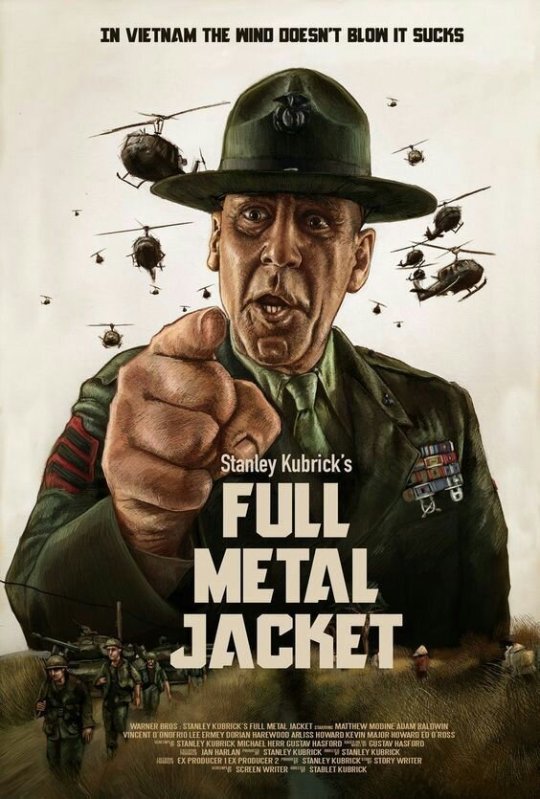
What makes a film a war story? The war itself does not matter, nor does the timeframe, or the individual battles. It is the emotions depicted, the reasoning for the film, and the overlining themes of heroism and bravery that make certain movies war films. Dunkirk shows the historical battle for Dunkirk where the allied forces needed to be rescued by their own British civilians. The story is true as it is powerful showing the desperate situation these men had to endure and the nationalism and bravery the civilians of Great Britain displayed as they traveled to France to save their army.
Full Metal Jacket also showed the dedication of soldiers and opens up to the long-held idea that war is hell. Although these two films were created decades apart from each other and depict wars from separate time periods, they still share the same values, when it comes to the dedication of soldiers.
While everyone is in agreement of uplifting the men who fought and died during combat, not all war movies praised the specific wars that our country participated in. Going back to the definition of a war film, it’s reasoning. “Joker” in the film Full Metal Jacket, played a journalist in the marines long out of combat. He wore a peace symbol button that conflicted with the message written on his helmet “Born to Kill”. After his traumatizing time in boot camp, months spent in Vietnam, then finally his brush in conflict, Joker learned much about this war. He saw that the people they are supposed to be helping hated them, the people they killed were just farmers, and the war itself was changing the psychology of its soldiers.
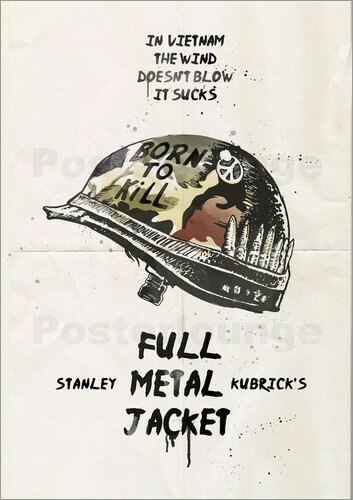
Compare the suicidal scenes of Full Metal Jacket to Dunkirk. When Private Leonard murder-suicides his Sargent, it was out of revenge for the mistreatment he was put through. When what we saw from the allied soldier on the beach of Dunkirk was an act of desperation. He walked into the sea himself and was never seen again a result of the stressful situation he was in. Sargent Hartford’s death was more of a shocking turn and a statement against the harsh treatment of soldiers in training.
Full Metal Jacket was made to show the real conflicts of war and the suffering that so many men went through for a war that didn’t need to be fought. Dunkirk on the other hand showed a completely different war and had a much more positive message. It was made to show a better side of humanity. In the darkest of moments humans won’t fall apart, but group together as a nation and risk their own life to save others. In Dunkirk, you didn’t have to be a soldier, or even a man, to be a hero. You didn’t have to win the battle to be victorious or even put up a decent fight. As WWII had a more positive cause, the reasoning behind the war films made about it tends to also show positivity. The Vietnam war was widely protested against so the films about it view the war negatively.
While war films can have happy endings, and often do so, the themes of survival, and civilian intervention are not typical in these type of films but do occur.
It seems fairly obvious that Dunkirk should be labeled a war film. After all, it fits the parameter being a fictional piece based on true events of war, the Battle of Dunkirk. But that only describes the setting that needed to be placed, without any indications of what type of action should be featured. “Fighting that war, planning it, and undergoing combat within it should fill the major portion of the running time” (filmrefference.com).
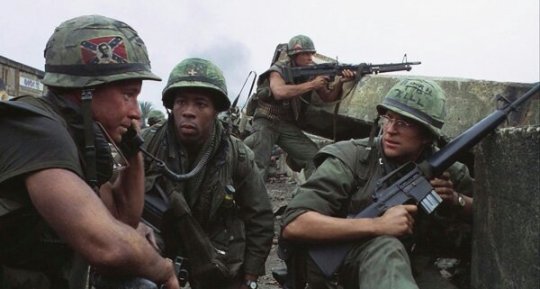
Going by this definition of a war film, it’s hard to say that enough action was taken to make Dunkirk a war movie rather than an evacuation movie. Conflict occurs when two foes confront each other, but throughout this film, we saw the Allied Forces as open targets. They had no way to fight and little ways to run. The film was dominated by Germany’s success in cornering the British and French troops onto a beach where they could pick them off slowly. But there still are war movies that are not heavily reliant on action. Films like The Best Years of Our Lives displayed a post-war scenario that was heavily influenced by war, but not inclined to show conflict. Other films will do the same using flashbacks to return to the war periodically as it is an important part of their plot. The question is, do these count as war films?
“I didn’t view this as a war film,” says the director. “I viewed it as a survival story”
Christopher Nolan went to another great director for advice when making this film, the creator of Saving Private Ryan, Steven Spielberg. In Spielberg’s recreation of the battle at Omaha Beach, his war movie featured limbs being blown off, vicious battles, and depressing losses that the audience empathized with.
“We didn’t want to compete with that because it is such an achievement. I realized I was looking for a different type of tension” (Nolan).
This director found many ways for his film to distinguish itself from others.
Besides Nolan’s classic cinematography techniques and overly extreme attention to detail, he strived to be different in a variety of ways.
“I needed suspense, and the language of suspense is one where you can’t take your eyes from the screen,” he says. “The language of horror is one where you hide your eyes. You’re looking away. It’s a different form of tension (Lang).
The way Nolan got his audience to keep their eyes glued to the screen was by crafting a thriller like we’ve never seen before. He gave us characters we had no reason to connect to. A random British teen in the middle of the war, a pilot making a brief flight, and a man with nothing but his son, a friend, and their sailboat. The names of the characters did not matter as some of them were only mentioned once. In the traditional war film like Full Metal Jacket, we get involved with our characters, the Marines showed in that film were brought up from the beginning of their training at boot camp. We saw these characters develop into killers before they were shipped out to Vietnam. It was important to see these character’s rise up because it made the film all that more traumatic when they were killed. They spoke to each other, told them stories and we learned of all of their differences being from random parts of our nation. We wanted to see them succeed, not just because they were on the American front, but because we had time invested in them and learned who they were.
Christopher Nolan’s approach to recreating the war was much more different as it was told like a thriller. It was hard to remember characters name’s and faces as they all seemed to be the same. Tommy, who started in The Mole, lost his entire squad within the first minute of the movie. Normally your men are the ones who will stick with you throughout the entire movie, naturally an elite killing force. But Tommy was an inexperienced soldier on his own. His first friend was a French soldier who didn’t speak English and was completely silent in most moments. Together the two met other British soldiers, but still, there was little dialogue. The British soldiers, for the most part, looked alike and when the French spoke, there were no subtitles making you rely almost entirely on what you saw, which was a visual masterpiece.
Instead of focusing the camera on the main points of battle, the conflict, German U boats and air force fleets, we got to see the faces of the terrified Allied soldiers as misfortune struck. When a torpedo was fired at the large destroyer they sneaked on to, we never saw where the missile came from, only the effects of its destruction. When they were in the boat waiting for the tide to come in, you had no idea where the shots were coming from while the soldiers were trapped within the boat. It was all very real, the emotions of the audience were shared with the film’s characters as we had no more information about the world than they did.

The aspect of closely following a set of characters and giving the audience a first-person viewpoint rather than the full knowledge of a third person view is common in thrillers, not war movies. Traditionally, war films pride the soldier’s tactics and show the battle plans usually spoken by generals around a large table then carried out by the foot soldiers. Or in Full Metal Jacket, when the sniper was gunning them down in the final scene, we all knew where she was, but the men didn’t. Imagine if we could have closer felt the emotions that Joker did at that moment. It’s hard to when you know something that he doesn’t.
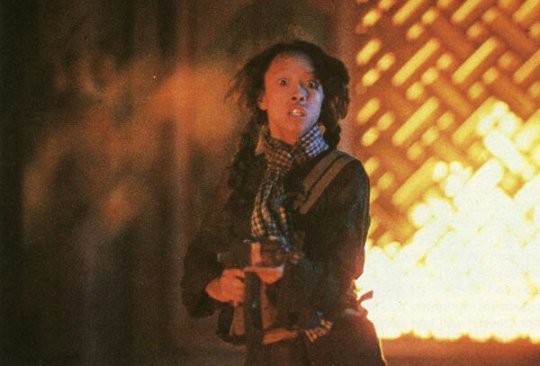
In Dunkirk, the idea of splitting the story into three separate pieces with different characters have different missions is not too uncommon in war movies. Joker and his buddy from boot camp, Cowboy, met after going their separate ways in the Marines. Similarly, but with an entirely different game plan, Nolan had his three separate stories on three separate timelines, but they all collided towards the end. It may have been confusing to think when you notice Tom Hardy’s character, the pilot, only has one hour of fuel, but Tommy lasted multiple days in Dunkirk. The entire story was broken into pieces then put back together to create a thrilling chain of events with action never letting up. Even in the regular war films, there is time set aside for plot, character development, and time elapsing. But in Dunkirk, it is explosions and gunshot with only the intense feeling of awaiting danger in these in-between time.
This suspense has a sound to it that kept the audience thrilled even in the dialogue-less quiet moments. Christopher Nolan’s composer Hans Zimmer has worked with him in the past and the two enjoy putting a special kind of sound illusion to give his films that suspenseful touch. He is able to create a tone that seems to be getting higher and higher without actually changing its audio. The technique is called The Shepard’s Tone, it’s used by creating multiple layers on an ongoing loop. Three tones are made at different levels but all play at once separated by octaves. As the audio plays out, the highest tone comes in but fades away, the middle tone plays loudly all the way through, and the deepest bass tone slowly comes into audibility. When placed in a loop, you will always hear two of the tones ascending up the scales at the same time. You think you are hearing something constantly ascending, just like the suspense in the movie. This never-ending intense loop sounds eerie like you are rising up without control, it relates directly to the rising tension of the film, which is why Christopher Nolan loves using it so much (Vox).
Click here for a video with the full explanation.
Music like this should be featured in war movies, but it’s not because it’s too much. The goal of a war movie isn’t to scare or intimidate your audience. The bloodshed and gore they show in Full Metal Jacket or Saving Private Ryan is purely for historical accuracy. Dunkirk doesn’t even feature that much blood and remained a PG-13 movie despite the countless deaths. Perhaps this is because Dunkirk is one of the few war movies where you should fear drowning more than you should gunfire.
Throughout the several scenes out at sea, there is always the threat of sinking. Within the labyrinths of WWII warships, one torpedo strike could fill an entire level full of water with no way out. In this film, you either drowned or were blown away off camera by dropped bombs. Not one big name character died, they didn’t use any cheap gimmicks to make you feel sad. This wasn’t an emotional movie it was an intense one. Films like, Saving Private Ryan, wanted you to feel sad for the lost characters, and in Full Metal Jacket, you were supposed to think about the corruption of government. But Dunkirk the only way that you connected with these characters was by seeing through their eyes better than you did in either of those two war films.
Unlike Full Metal Jacket with its gloomy ending where we question what it is we are fighting for, Dunkirk ends at first with a glimpse into what “survivors guilt” looks like. They were just saved by an amazing feat of heroism like we see in countless movies, but no one was happy. They rode away from danger with blue faces covered in black oil. Tommy had seen so many deaths, the owner of the sailboat and his son had lost a friend, and Tom Hardy’s flew away into the sunset deeper into German territory out of fuel and ready to surrender. They were depressed as they got off their ships and made their way into England to prepare for the inevitable next stages of the war fearing Germany would soon conquer the world.
The blind man handing out blankets to the troops told everyone “Well done.” One responded with “All we did is survive.” To which he replied, “That’s enough.” It wasn’t until they truly reached England that the story took an uplifting turn, because the film’s message wasn’t at all about the troops in battle or heroism of soldiers because all they really did was die and cower. The real heroes were the citizens of Britain who risked their lives to save their army, but still, they all rejoiced as the soldiers returned home. There was talk in the papers of the bravery those sailors had and their prime minister Churchill rallied the nation with his famous speech “We Shall Fight on the Beaches”. No true war film shows such defeat, no war film avoids the theme of soldiers’ bravery and sorrow over fallen brothers.
Can we call the film about the greatest military disaster a war movie when the true heroes were not soldiers but civilians? Can we call Dunkirk a war movie if it was a one-sided battle with enemies on all sides with a vicious air force that slaughtered the Allied men?
Dunkirk is without a doubt a war film, yet it has the tendencies of a good thriller. Who is to say that thriller cannot take on a battlefield? Who’s to say war films can’t have the aspects of horror? We mix genres more and more today with our interest shrinking and greater stories being required. This type of film needed to take place on Dunkirk because you cannot be so easily thrilled with regular warfare which the Battle for Dunkirk was not.
A horror takes place when characters are put up against a force so powerful that they are completely outmatched and only until they have grown as characters can they lay an attack. But for the most part, horror movies are just about survival, which Christopher Nolan himself said, this is not a war film, but a survival film. It has the music of a thriller and the videography of a blockbuster that showed the emotions of the battle that took place long ago. If there can be such thing as a thriller war film, then that is what Dunkirk is classified as. It cannot be just a war film, because it is the first of its kind, different than the gritty Full Metal Jacket, or the blood-filled Saving Private Ryan. Dunkirk is virtual reality without the headset and a visual masterpiece to all who watch it.
Sources
Lang, Brent. “Christopher Nolan Gets Candid on the State of Movies, Rise of TV and Spielberg’s Influence.” Variety, 8 Nov. 2017. Vox, director. The Sound Illusion That Makes Dunkirk so Intense. 26 July 2017. “War Films.” Film Reference.
Dunkirk Film Analysis I've talked about the film Dunkirk in the past, it's a great film to study. In this post, I'll be using comparative elements to discover its true form.
0 notes
Text
Syraq SITREP 49: Douma Chemical Attack Case Falling Apart, Israeli Threats Against Damascus, and U.S. Demanding Turkey Drop S400 Purchase
U.S./UK Accuse Russia of Covering Up Evidence in Douma as Case for Poison Gas Attack Falls Apart, OPCW Shot At to Delay Their Entry into the Town Outside Damascus
Germany-based blogger 'b' over at Moon of Alabama (often abbreviated in the alt-media as MoA) has put together a series of posts about the Douma incident, linking to testimony from doctors and (non White Helmets) first responders who stayed there after the jihadists left on buses for Idlib. The evacuation of the Jaish al Islam (JaI) jihadists was part of a ceasefire deal negotiated by the Russians, who agreed to only use their own military police rather than Syrian government troops in the town for a certain time period. It was that agreement, as well as the Anglo-American strikes around Damascus, that Moscow blamed for any delays in OPCW personnel deploying to the town after their arrival in the country last Friday. The remaining Douma hospital staff overwhelmingly insist that there was no chemical attack, and Russian journalist Evgeny Poddubiny met with an eleven year old boy, Hassan Diab, who was exploited as an unwitting crisis actor by White Helmets promising him food. Other civilians who were said to be suffering from dust and smoke inhalation after a series of government air strikes, according to the physician who spoke with long-time Independent Mideast correspondent Robert Fisk, were panicked by shouts of 'gas attack!' in the Douma hospital emergency room. They are seen hosing themselves off and being doused with water by White Helmets-linked activists in the video circulated online after the alleged chemical attack.
While this story presented to Fisk does not answer all questions regarding what happened, such as where the supposedly chemical tainted blood and urine samples came from that U.S. or its partner intelligence agencies obtained from Douma residents (if such samples actually exist or haven't been falsified off site), it received a vociferous reaction from panicked regime change advocates on social media. Those insisting chlorine gas was dropped on the town from Assad government helicopters, like the French government's released dossier, rely on alleged open source evidence, compiled by the usual USAID/Gov-oogle/Atlantic Council (read: NATO) funded suspects at Bellingcat. According to Bellingcat's Leicester, UK-based professional couch potato Eliot Higgins, a chlorine canister killed or sickened over a score of residents in one Douma house alone. RogueMoney readers will recall that Higgins has been an 'open source' 'go to guy' when US/NATO need evidence of any Syrian or Russian government wrongdoing for almost five years. This has been Higgins role through the Ukraine War, dating back to the mainstream media promoting 'Brown Moses' constantly shifting analyses of alleged sarin-tipped rocket flight paths from government-held territory near East Ghouta in August 2013.
The fact that Russian military police visiting the building found no traces of either the supposedly helo-dropped chlorine canister embedded in the roof nor the residents killed or injured by gas after sheltering in the basement, according to Higgins, is chalked up to Russian concealment. The Russians are so determined to keep OPCW inspectors from the town, that they allegedly opened fire or arrange for someone to shoot at their SUV convoy. However a Russian soldier was reportedly injured in this murky attack by unknown gunmen, and there is no reason to believe the OPCW won't return to the town on Friday or Saturday. Furthermore, if the Russian chemical and biological warfare specialists can successfully scrub all traces of chlorine if not sarin nerve agent from the town in just 72 to 96 hours, they will be far more capable than the UK technicians tasked with cleaning up after a tiny amount (in comparison) of novichok nerve agent which was said to have poisoned Sergey and Yulia Skripal in Salisbury. Obviously, the U.S. and UK arguments that the Russians are even capable of such an extensive cover up across many chemical contaminated acres over a few days is absurd. But that isn't stopping the increasingly shrill and desperate Anglo-Americans from making the charges to the OPCW -- which has been under pressure from all sides since the Skripal incident in the UK.
Anglo-American Establishment: When Disbelieved, Shout Louder and Flail Your Arms More
To distract from such glaring contradictions and holes in their argument, including the basic question of why Assad would resort to chemical weapons when he already had the jihadists holed up in Douma surrounded on the verge of surrender, the British have taken the lead in a campaign of vilification against anti-Syria regime change activists. The Huffington Post UK and taxpayer funded BBC have attacked activists like Vanessa Beeley and former Ambassador Peter Ford, as well as UK academics like Tim Hayward who've undermined their story line. U.S. taxpayer funded outlets like RFE/RL spin off Polygraph.info have joined in this campaign, with thus far minimal success. Public 'support' for the strikes, even according to the mainstream media commissioned polls in the UK, is abysmally low or at best, indifferent. Furthermore, the longer U.S.-UK involvement in hostilities with Damascus and its Iranian/Lebanese/Iraqi Hezbollah allies drags on, the greater the risk of casualties to the troops deployed inside Syria and thus greater decline of deployed forces morale and support back home.
While a passionate few continue to scream for follow on air strikes against Assad, the recently reported by TASS high level meetings between Russian and NATO commanders to discuss Syria suggests no immediate follow on strikes to those of April 13 are being readied. So too, does Moscow's dialing down the hot rhetoric about targeting U.S. missile launch platforms, meaning jets and ships -- for now. The stories from Bloomberg about additional Kremlin concessions being put on the table to avoid the new sanctions UN Ambassador Nikki Haley promised, and which President Trump postponed, seem like so much wishful thinking in Washington. Not unlike the wishful thinking of both virulently anti-Trumpers convinced The Donald and Putin are secretly in cahoots, and the QAnon followers who believe the same thing.
Despite his inexcusable failure to stand up to the neocons in his Administration and oppose the unjustified and illegal under international law strikes, Trump's ego may have smarted from his own sense of being rolled on anything Russia or Syria related. Subsequently, the Commander and Chief overruled and humiliated his infamously aggressive neocon adviser Nikki Haley, and it leaked to the Cold War 2 maniacs at the Washington/Langley/Bezos Post that the Russian Embassy had been instructed to disregard her public statements as policy. Such public humiliations from this boss typically precede his signature line from The Apprentice, which is about the only thing President Trump has proven good at , saying to insubordinate or leaky advisers, "You're fired." Haley may believe that her patron the pro-Israel billionaire Sheldon Adelson who partly finances the Republican Party can intervene with the Oval Office to save her job, but she's likely mistaken.
Next week's arrival of the USS Harry S. Truman battle group, said by some to indicate the imminent outbreak of hostilities between the Americans and Russians in the eastern Mediterranean, now looks somewhat anti-climactic. Additional chemical false flags are possible, particularly in far southern Syria close to the Israeli held Golan Heights, and in the north of Idlib province, but the panic over their case falling apart in Douma suggests the neocons fear additional staged events could lose their impact. Even if some of the incidents turned out to be partially real, the neocons, knowing only how to double down, can't cope with the broader Atlantic public's chemical and Syria fatigue. The war has dragged on for almost eight years, and in that time there have been many atrocities and the mass use of indiscriminate firepower -- with war crimes committed by the jihadists seeking to overthrow Assad downplayed or dismissed by the legacy media (so too, has been any introspection as to how the CIA-planned destruction of the Syrian state and introducing vast numbers of GCC-funded arms and foreign jihadists into the country created the Islamic State 'caliphate'). Nonetheless, it remains to be seen if Trump will take the next logical step and fire neocon Nikki Haley, and follow up his anticipated peace summit with North Korea's Kim Jong Un by meeting with Vladimir Putin. If he can, and no further strikes are launched by anybody but the spoiler Israelis in Syria, then perhaps the Russian Analyst can say real progress is being achieved towards global peace. But again, this prospect still leaves regional players Saudi Arabia and Israel plus their pals in what our LaRouchePAC friends call the lingering British Empire unwilling to accept peace in the Levant with Assad secure in power and Hezbollah if not its patron in Iran militarily stronger than ever.
Moscow Threatened to Give S300s to Syria After the Anglo-American Strikes: What Will Israel Do? Probably More of the Same -- Harassment via Standoff Missile Attacks
With a more robust series of Syria strikes seemingly off the table for now, and President focused on upcoming face to face talks with North Korea, the pressure is on Israel to make something happen to disrupt its enemies consolidation in the Levant. As the Israeli Air Force has found, standoff missile strikes against alleged Iranian targets inside Syria are no longer as effective as they were in the years of the high intensity fighting inside the country, when the Syrian air defenses were in total disarray. Moscow has stayed out of combat with the Israelis, fully aware with its systems based at Kheimmim and Tartus of when the Israeli jets are over neighboring Lebanon if not tracking them from the moment they take off. But this does not mean it the Russians have been completely on the sidelines when it comes to defending their allies in Damascus from Tel Aviv's depredations.
The Syrian air defenses, even if their effectiveness against the Anglo-American missiles were exaggerated, nonetheless have demonstrated the capability to shoot down an Israeli F-16I and damage IAF F-15s (and perhaps the vaunted F35 'Adirs' stealth jets too). This is certainly due to Russian upgrades to command and control, particularly fiber optic links between SAM sites that cannot be jammed from the air or sea. The recent Israeli electronic attack on Homs, if it did happen, was originally reported as a missile strike on a base where Russian personnel were known to be present. If that were to happen, it would represent a serious escalation on the part of the Israelis against the Russians, and a violation of their tacit agreement that the IAF avoids hitting Russian personnel and stays out of Syrian air space (while still violating that of the Lebanese). As Elijah J. Magnier reported in February, the Israeli-Russian understandings and deconfliction in Syria also do not preclude Damascus from firing its longer range if older S200 SAMs at IAF jets while they are still over Lebanese territory, especially if they get closer to Damascus. Those who choose to believe the Daily Beast's repetition of Pentagon lies regarding 100% of the missiles fired striking their targets are deluding themselves.
The Israelis understand that lobbing missiles at Syrian bases and killing a handful of IRGC officers is one thing; but to make any real impact, their strategy of targeted harassment would have to give way to heavier strikes and therefore greater risking of downed aircraft (as well as that Moscow could tear up the deal it made with Tel Aviv and transfer more S300s to Syria by way of an overland shipment via Iraq to Iran). If Hezbollah chooses to use even a small but highly accurate portion of its huge missile arsenal to retaliate against Israel, the Israelis have threatened to personally hold Assad responsible and kill him in a targeted strike. But the present Israeli government, notwithstanding its warnings that it will go to war in order to prevent Iran from establishing a foothold in Syria (too late), has plenty to lose in that scenario, both economically and above all in terms of its diminishing ability to overawe its enemies.
For the Israelis, this conundrum is far larger than whether or not Damascus gets long range S300 SAMs to defend itself. The IAF has practiced against older models sold to the Greeks by the Russians, but is not prepared to face off with the latest improved versions that would presumably be integrated by data link to the S400s the Israelis would avoid targeting at Kheimmim. Israel has never attacked the forces of a nuclear armed power openly flying their flag -- at least with the exception of its covered up assault on the USS Liberty in 1967 (dogfights with Soviet pilots flying for the Egyptian Air Force over the Sinai in the late 1960s or early 70s war of attrition era leading up to the 1973 Yom Kippur War don't count). Thus the most logical course for the Israelis and the one politically acceptable to both the U.S. and Russians is to muddle along, continuing to lob missiles here and there from over Lebanon or Israeli air space at alleged 'Iranian bases' inside Syria.
Winning the Longer Game: Despite Giving Verbal Endorsement of the U.S./UK Strikes, Turkey is Still Pivoting into the Eurasian Camp and Away from the Americans and NATO
Damascus can absorb such attacks because it knows with Russia's help it's still winning the war, knocking down many of the enemy SAMs with its new Pantsir point defense systems and soon, the Syrian Arab Army will be driving the jihadists Israel has carefully tended on its border to flee. After the territories south of Damascus Idlib province, which is under de facto Turkish protection (without an actual presence by Turkey's Army). As Magnier writes, Assad's strategy advised by the Russians is to make the lingering US and Turkish occupations irrelevant. So long as Moscow can do this, and keep the Turks appeased, while avoiding direct confrontation with either the Americans or Israelis, the Kremlin will keep on winning in the Mideast. The only gambit that can stop this trend, or so the neocons may believe, is a broad regional war that Russia will struggle to stay out of due to its Syrian, Iranian and Hezbollah allies getting heavily bombarded. That is, the big Mideast war between the Americans and Israelis on one side and the 'Axis of Resistance' aka Syria/Hezbollah/Iran backed by the Russians that Team RogueMoney's mentor 'W the Intelligence Insider' has been predicting for the last two years.
Barring the big regional war (which still would not be WW3 only approach it) scenario, the proof of the Russians being seen as a strengthening horse rather than a diminishing one like the Americans' is found in Turkey, Saudi Arabia, Egypt, the UAE and Iran's purchases of Russian weaponry. All of the former except for the latter having been since 1979, American allies. These are tangible multi-billion dollar (or soon payable in euros, yuan and rubles) tokens of Moscow's growing clout in the region, which the death (apparently from natural causes in Paris) of eastern Libya's pro-Russian General Haftar will not reverse. Neither can the strikes that Washington neocons hoped would show Putin as a worthless ally who cannot defend Assad from whatever the U.S. and its sidekick Israel will themselves to do, since word gets around among the informed regarding how few missiles actually hit their targets -- and the attacks changed nothing on the ground.
As London Paul pointed out in his Wednesday appearance this week on RogueMoney radio, all the April 13 strikes did was increase the determination of Moscow, Beijing and Tehran to harden their defenses and joint efforts to diplomatically and economically undermine the Americans. And that response will not be military, but overwhelmingly economic in nature as dollar dumping accelerates. But in order to dump the dollar in trade without fearing direct attack, countries need strong defenses. Enter Moscow as a provider of low-cost security for the Eurasian powers, fulfilling the role China is still reluctant to play beyond its Asia Pacific region for historic and financial reasons (still many stakes in the sinking U.S. economy). When Washington is reduced to pleading with the Turks not to buy S400s or they could face sanctions, and hinting its new partners in South Asia the Indians could be next to be sanctioned -- you know which side senses that time isn't on its side.
#Evgeny Poddubiny#HassanDiab#Robert Fisk#Fisk#RobertFisk#TheIndependent#OPCW#USUK#FUKUS#firstresponders#S300#SyrianAirDefense#SyrianArabArmy#SAA#SaudiTroops#Saudis#USSLiberty#Israelis#IsraeliAirForce#IAF#Hezbollah#Sinai#Assad#Trump#SyriaStrikes#TurkeyArmy#Turkey#S400#UAE#Egypt
0 notes
Photo
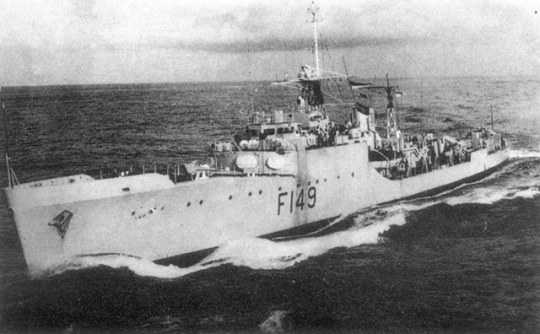
THE STORY OF KHUKRI AS TOLD BY CAPTAIN ALLAN RODRIGUES TO COMMEMORATE NAVY WEEk 23rd December 2010 Dear Ms Ameeta Mulla Wattal, I am an ex- Indian naval officer who left the service honourably in 1994. I live in New Zealand, and work in Australia and New Zealand these days. This email refers to an article you wrote some five years ago very poignantly, on your father the Late Captain Mulla, pondering why he chose to go down with his ship. The article obviously struck a chord with many of your readers, and in the way of the internet, travelled the world before it entered my mail box a few days ago, via a social network maintained by the 42nd NDA and 51st IMA course. I did not know your father personally, but I feel I have always known him and for what he stood for, all of my adult life. I missed the fighting in 1971 as I was cadet in the NDA at the time, and only passed out and joined a warship at sea in June 1972, six months after the war ended. In the event I became an Anti Submarine specialist and along the way, I ended up commanding three warships including INS Himgiri (also an anti submarine frigate, although a more modernised version of the original Khukri). I retired after 20 years, joined industry, and eventually moved across the Pacific and the Tasman Sea to New Zealand. I only say this because it has some context to the comments I make below, on the decision by your father to go down with his ship. In doing so I hope to capture the circumstances (and perhaps the greater purpose) of why captains of warships in extreme circumstances, take such drastic actions that seem to lack purpose or reason (particularly to the public at large). I am sure many naval officers of senior rank and certainly more qualified than me, may well have commented at length after reading your article. I just felt I might throw some light on a take that has largely been neglected. I know the pain never goes away and I apologise for any anguish I might give you in the process, but I do believe that Captain Mulla did something for the service that night, that has not been either understood or recognised, by both the navy, and the public at large. The Indian Navy of 1971 was a different beast from the one we have today. Little was known about Anti-submarine warfare (ASW) at the time. We commissioned our first submarine in 1968 in the then Soviet Union, and had barely begun operating a fledgling submarine arm by 1970. Pakistan by contrast, had been operating submarines since the early sixties. Ships like the Khukri and Kirpan supposedly specialised in ASW, formed the vanguard against the fight against Pakistani submarines. They had little in the way of operational experience against submarines, and even less knowledge about the ocean environment. The physics of detection can be explained in simple non technical terms. The Khukri had sonar called the ‘Sonar 170’. which was the best we had at the time. It had a maximum range (in laboratory conditions) of only 1500 yards. We knew little about the harsh nature of the environment underwater. The seas in the tropical waters off India’s coastline are heated up in the morning and afternoons, raising surface temperatures to ambient levels. The worst effect is in the afternoons. The laws of physics then apply. They literally bend the sonar waves downwards, severely limiting detection range. Since deeper waters are ice cold, there is meeting point of the warm waters on the top and the cold waters below. This meeting point is called the 'layer' where the sonar beam bounces off and is almost totally reflected upwards. There is very little penetration below the layer. These layers lie between 30 and 60 metres depth in tropical waters, and are exploited by expert submariners who are able to hide under it. It took us another 15 years after the war, all which I was professionally involved with in one way or then other, to fully understand the nature of anti-submarine warfare, and to learn how to work with the physical limitations imposed by a hostile ocean underwater environment. Submarines on the other hand are not as handicapped, as they do not need to transmit on their sonars to detect a ship. Their engines are silent. They can consequently listen out for a warship and even identify a type of ship and its signature from the sound of its engines. Skilled submariners hide beneath the layer and approach with stealth. They only transmit at the last possible moment when they need a final range to fire their torpedos. Warships at sea in 1971 (and Captain Mulla in particular) would have been more than aware of these limitations. They would have known two simple facts (a) That a submarine at sea would have already detected a surface ship long before the ship had even reached any kind of detection range; (b) That even if the warship did detect the submarine, it would be at the penultimate moment, when the submarine had already fired, (or was on the verge of firing) its torpedoes, giving the warship a few minutes at best, to take avoiding action, let alone counterattack. The Pak submarine that sank the Khukri used its environment to maximum advantage. In hind sight and over the years, we developed better sonars and better tactics. We employed dedicated ASW aircraft with sonobuoys and magnetic detectors, helicopter with dunking sonars, and yes we spent a lot of time learning the harsh facts of the ocean environment we were forced to operate in. This is the context in which ships put to sea in 1971, against an adversary who was well versed in using submarines to maximum advantage. Our own ASW ships had little in the way of riposte or as much experience we would have liked to have had before the war of fighting submarines. In the event every sailor at sea recognises a moment of truth, when all of his training and skills are put to the ultimate test. It is the moment when the ship beats to quarters and goes into action against an enemy in sight, or an enemy that has been detected. Khukri and Kirpan were operating in submarine infested waters. The ship would have gone to 'action stations' against a submarine many times over, in the days and nights preceding the sinking of the Khukri, sometimes for genuine reasons, sometimes for false alarms. All of this would have exhausted the crew and formed the 'fog of war' that hindsight experts, armchair generals/admirals and the public at large never quite get. Each time the crew of the Khukri beat to quarters and battened down for action, a clarion call would have been broadcast on its tannoy “Hands to action stations _ assume first degree anti-submarine readiness - assume damage control state one condition Zulu”. The crew of the Khukri would have known fully level, that they were going against a committed enemy, and that the dice were loaded against them. Each of them would have been wondering whether they were going to come out of the action alive or dead. This is an age old fear that men have, and then learn to conquer, when they go to sea and to war. It is the nature of the beast. The army and the air force face similar issues, which they deal with in their own inimitable way. The people most at risk on board the Khukri that night would have been its technical departments; engineering and electrical officers and sailors, closed up at action stations in the bowels of the ship three and four decks below the waterline, keeping the engines and the machinery running, so that their captain could fight. Each of them knew if a torpedo were to hit, it would do so well above where they were located, and that the chances of them surviving would be a lot less than those sailors who were fortunate to be located on the upper decks, and above the waterline. it takes a special kind of motivation to get these men to go down into the bowels of a fighting ship whilst in action against a submarine. they do so each time out of a sense of duty that the ship cannot fight without them and mostly because they recognise that one single unspoken truth… that their captain will not forsake them; that their captain will not leave them behind. that is the crux of the why, and the reason why captains at sea honour this unspoken agreement. Captain mulla would have known that many of his boys were trapped (but yet alive) in the bowels of his ship when it went down, in the few minutes after the torpedoes hit. he tried to help as many as he could, but i suspect he could not bring himself to save himself, whilst his boys were dying down below. that he chose to go down is a personal decision, perhaps even a moral decision; but it was a decision that set a standard that will save lives in future actions. it forced all of us who came after him, and who were privileged to command men in peace and war, to recognise that undeniable and unspoken bond between fighting men … that you fight your ship against an enemy (or the ocean in a storm), with what you have, and to the best of your ability, and that come what may, you never forsake your troops or leave a man under your command, behind you. What Captain Mulla did that fateful day has had an enormous and positive impact on the service he loved and on the men who continue to serve it to this day. It reminds every one of us chosen to command of the qualities of leadership needed under duress, and of the ultimate responsibility we have to the families of the men we command; "You never forsake your men – You never leave a man behind". I know that this hardly helps when trying to explain all of this to the family of a captain who makes the ultimate sacrifice. Nor does it assuage the grief of a young girl trying to understand why her father chose to voluntarily die, rather than save himself. For a fledgling service post independent India trying to forge its own traditions independent of the Royal Indian Navy of yore, the impact was enormous. It was one of the many actions in the 1971 war that made us equal partners with the Army and Air force in the defence of independent India. I am reminded of the last few stanzas of Ronald Hopwood?s classic poem 'Our Fathers' that I quote below. “When we've raced the seagulls, run submerged across the Bay, When we've tapped a conversation fifteen hundred miles away, When the gyros spin superbly, when we've done away with coals, And the tanks are full of fuel, and the targets full of holes, When the margin's full of safety, when the weakest in the fleet Is a Hyper-Super-Dreadnought, when the squadrons are complete, Let us pause awhile and ponder, in the light of days gone by, With their strange old ships and weapons, what our Fathers did, and why. Then if still we dare to argue that we're just as good as they, We can seek the God of Battles on our knees, and humbly pray That the work we leave behind us, when our earthly race is run, May be half as well completed as our Fathers' work was done”. My wife Sharon and I wish you and your family a great Christmas and a happy and prosperous New Year 2011. If you or your family do visit New Zealand do look us up. Allan Rodrigues DirectorNE http://ift.tt/2jmRz5A
0 notes
Text
Syraq SITREP 40: From Salisbury to Syria
Was the Novichok Poisoning of Sergey Skripal a Dirty Deep State Back Up Plan After Chemical False Flags Planned for Ghouta to Justify U.S. Strikes on Damascus Failed to Go Off?
As many in the new and alternative media rightly suspect, the driver of allegations Her Majesty's Government demands be taken seriously but refuses to offer compelling evidence for (including the presumably near death medical condition of a Russian citizen and resident of Moscow, Yulia Skripal) seems to be found far beyond Old Blighty. The desire to accuse Putin of something shortly before he easily wins what's expected to be a fourth and final term in office Sunday, or of somehow getting FIFA to cancel the World Cup to be hosted this summer in the Russian Federation -- both seem insufficient motives to explain the present hysterics.
Unless a planned economic shock to the rotten, tottering Western fiat currencies-led financial order is imminent, as London Paul suggested during his appearances on RogueMoney this week, the Russian Analyst's conclusion is that the Salisbury event (or non-event false flag blamed on Russia) is mostly about Syria. Namely, that the Salisbury event may have been a hastily arranged 'back up plan' after major chemical false flag attacks planned to justify direct U.S. bombing of Syrian government forces and their embedded Russian advisers failed.
The fact that Sergey Skripal's daughter was visiting him from Moscow and may have been willing to convey a message on behalf of her father to the Russian authorities concerning Sergey's involvement in generating fake kompromat about Trump for Christopher Steele and the 'ex' MI6 men at Orbis Business Intelligence could have hastened their poisoning. Regardless, likely due to superb Russian intelligence and Syrian government infiltration of the Saudi-funded jihadist organizations tasked with carrying out the chemical false flags, and with the Tiger Forces advancing rapidly to carve up militant controlled territory in Ghouta, the big false flag planned for the Damascus exurbs didn't happen. Instead, a handful of alleged chlorine poisoning incidents occurred that could not be substantiated amidst heavy conventional fighting in urban and semi-urban terrain.
Rapid Tiger Forces Advance, Russian/Syrian Intelligence Seemingly Foil Chemical False Flag
The Syrian Arab Army claim to have captured a jihadi chlorine chemical facility set up in an old factory warehouse, which may have been used to stage the attacks. As of Saturday the Associated Press reports the SAA has captured 70% of the formerly rebel (including Al-Qaeda and ISIS linked terrorists) pocket east of Damascus. Tens of thousand have fled the fighting, taking advantage of safe corridors established by the SAA and monitored by Russian drones (which presumably, are also loitering to watch the front lines for any jihadi planted chemical bombs). The only military success the jihadis could claim as some of their young men presumably ditched their trenches and fled among civilian refugees was the shoot down of a Syrian government helicopter by one of their few remaining 'Osa' SAM systems captured from the Syrian Army in 2012-13.
The Russian Defense Ministry's warnings about an imminent collection of false flag chemical attacks to be blamed on Damascus and used as a pretext for American bombing of the Syrian capitol likely also played a role. The Skripal case of course overshadowed Moscow's warnings to the Americans in the U.S. and UK media, with only a few outlets reporting Chief of Staff Valery Gerasimov's vow to defend Russian forces embedded with Syrian units if they came under attack with anti-air and possible anti-shipping strikes on US Air Force attackers and perhaps, Tomahawk-launching U.S. Navy ships in the Mediterranean. Gerasimov's public remarks and his conversation with counterpart U.S. Joint Chiefs of Staff chairman Marine Gen. Joseph Dunford came after Defense Secretary James Mattis and more explicitly, crazed neocon UN Ambassador Nikki Haley warned of American military action if the Syrian government continued to use chemical weapons or commit atrocities in bombing Ghouta. Not content merely to threaten a country backed by the Russia/China alliance, the deranged Haley also warned that the Russian chemical attack in the UK could be repeated on the streets of New York City. In its briefing at the end of the week, the Russian Defense Ministry did not let up on warning the Americans against staging any chemical provocations. It claimed specifically that U.S. special forces or CIA were aiding jihadis with training on how to stage chemical attacks at the al-Tanf base in southeastern Syria, close to the Jordanian border.
Putin's March 1, 2018 Warning as a Deterrent Against Major American Aggression Against Damascus?
While we don't know the most decisive factor in deterring further American aggression (so far) against the Syrian government, it seems Vladimir Putin's speech of March 1 was used both to unveil weapons systems long in development and in response to Russian intelligence regarding an imminent false flag facilitated American strike on Damascus. Putin's emphasis on hypersonic weaponry that U.S. Navy AEGIS and land-based ballistic missile defense systems cannot hope to intercept-- especially the operational on Russia's Southern Military District MiG31 jets [and supposedly Iskander derived] Khinzal system -- was no accident. As London Paul says, timing is everything and Putin declared he does not bluff. Just in case anyone at the Pentagon doubted the operational status of the Mach 8 and 1,200 mile striking range capable missile, the Russian Defense Ministry prominently displayed a Khinzhal test from a MiG31 days after Putin's speech, and the test was also featured on the English language network RT.
For Moscow, creating uncertainty in the mind of the aggressor -- even if the BUK or Pantsir SAMs engaging US jets near Damascus would be flying Syrian and not Russian flags while manned by Russian crews [as happened frequently during the Vietnam War] -- is deterrence. It's one thing for members of the Trump Administration like Haley who have no concept of military realities to imagine further American impunity in striking Damascus. It's another thing for competent professionals like CJCS Dunford to tell the neocons in the Administration that they cannot expect to carry out serious strikes in populated portions of Syria closer to Russian bases on the Med without anticipating losses. Including not just downed pilots but, as the serious injury to an Israeli Air Force F16 pilot in February showed, casualties among US aviation personnel too. Which leads us to the subject of American casualties and the end of illusions regarding a riskless U.S. partition of Syria together with the Turks.
HH60 Blackhawk Down at the Syraq Border and the Risks of Further American Casualties
The crash of an HH60 Blackhawk helicopter last week, which claimed the lives of seven U.S. servicemen [several of them National Guardsmen with civilian jobs] was not due to ground fire along the Syria-Iraq border. Nonetheless, the risk that man portable surface to air missiles either in ISIS hands or deployed by Hezbollah aligned Shi'a militia infiltrators could take down American choppers in the mostly desert, U.S. maintained zone of occupation east of the Euphrates is real. As are the risks of planted IEDs or anti-tank missile ambushes of American soldiers operating alongside Kurdish SDF units near the agreed deconfliction line with pro-Damascus forces.
As we've noted previously here at RogueMoney, Iraqi Shi'a militiamen have not lost their memories of fighting American occupiers in Baghdad back in the mid-2000s Sadr City battles, nor would Hezbollah lack Iraqi volunteers [including a few Kurdish speakers] for such missions targeting American personnel in eastern Syria. Thus even if Washington resorted to the standby from April 2017 of warning Russian forces to get out of the way before striking Syrian government bases, Moscow could still greenlight its Iranian and Lebanese Hezbollah allies hitting back via guerrilla warfare. And the last thing President Trump who campaigned against George W. Bush's invasion and occupation of Iraq wants is to have American soldiers dying in Syria in similar fashion to what was happening in Mesopotamia from 2003-2007.
Media Staging for False Flag Battles Between U.S. Troops and 'Russians' in Syria?
However, we still see a propaganda campaign advanced in the usual suspect outlets like NBC News and Business Insider claiming U.S. troops engaged in a 'massive battle' that slaughtered 300 Russian mercenaries of the company 'Wagner' on Feb. 7-8. As Der Spiegel reported on March 2, the actual number of dead Russian combatants was likely a dozen or less, and it isn't at all clear if the Russian private military contractors even knew American troops were present in the Kurdish SDF held oil field their Syrian client wanted seized before they advanced:
US troops in Syria are digging in and preparing for future attacks after a massive battle played out in the country's east that ended with up to 300 Russian mercenaries killed by US artillery and airpower.
Reporting from the ground in Syria, NBC News' Richard Engel and Kennet Werner spoke to Brig. Gen. Jonathan Braga, whose forces beat back the pro-Syrian government advance on a well known US position near valuable oilfields.
The Pentagon said the pro-Syrian forces, including many Russians hired by private military contractors, made an "unprovoked attack" on their positions with artillery fire. The US response included airstrikes and artillery shelling that sources say wiped out much of the advancing column in just minutes.
"Those artillery rounds could have landed and killed Americans, and that's why we continue to prepare our defenses," Braga, who directs the US-led operations against ISIS, told NBC News.
Braga also confirmed that it was largely Russian nationals that took part in the fighting, though the Kremlin denies this.
But despite the overwhelming victory that saw zero casualties on the US side, Braga said he's "absolutely concerned" about further clashes in the future.
After the massive battle, Russian job listing sites were seen as advertising security work in Syria, in what is likely a recruitment play for more mercenaries. A man claiming to recruit Russians to work as private military contractors said that the recruits he now met were joining up to take revenge on the US, after the battle shook their national pride. If the above looks to you like media staging for the next 'battle' between 'Russian mercenaries or even regular forces' and American troops to dial the Russia fever up another notch, then it looks like that to us as well. In reality, U.S. troops ought to be more concerned about IEDs or MANPADs in pro-Damascus forces hands rather than the fantasy presented by NBC News, Bloomberg and Business Insider of Russians attacking them across open ground with zero SAM support or air cover. If such a 'battle' does take place, it will likely be staged with the casualties vastly inflated. The deconfliction hotline between Dunford and Gerasimov and Kheimmim and U.S. bases in Turkey, Jordan and Qatar still works, for now. Is a Joint U.S.-Turkish Partition of Syria a Done Deal? Or Will Ankara and Washington Remain at Odds Over Manbij and the Kurdish Issue? With the remnants of the Ghouta pocket caught between the anvil of Russian and Syrian firepower and the hammer of humanitarian evacuation on the green buses, it seems too late for Washington and London to stop the full liberation of the Ghouta region. What's left then to the regime changists turned partitioners of Syria is further mischief alongside the Turks in the north, specifically around northern Aleppo, jihadi dominated Idlib and in the Kurdish northeast. The Turkish Army and its 'Free Syrian Army' Janissaries have nearly cut off Afrin, a city of 200,000. After receiving a warm reception from Kurds and Arabs alike when joining its YPG defenders, pro-Damascus miltias are no longer reinforcing the Kurds' losing position in the city.
It appears the Russian Analyst underestimated the Turks after their Euphrates Shield setbacks against ISIS/USUS and that their Army has found a formula for minimizing Turkish casualties, relying on the FSA and former ISIS members to assault Kurdish villages. Without SAMs or air cover from Turkish bombing, YPG units appear increasingly demoralized and the Kurdish political party's mouthpieces continue to cry about Moscow as much as Washington betraying them. YPG fighters were reportedly fleeing Afrin this weekend as residents looted government food wares and offices in preparation for a full siege.
In fairness to the YPG's supporters in Western countries, Moscow and Ankara by all appearances have struck a deal over Afrin, while the Turks and Americans wrangle over joint patrols supposedly planned for Manbij. Damascus threat to shoot down Turkish F16s has, for the moment, failed to materialize as the SAA concentrates its forces on mopping up in Ghouta. The Russians continue to goad the Americans using the Turks, most recenty announcing this week that S400 SAMs will be delivered to Ankara in 2020. U.S. Senators have responded by demanding sanctions against any nation including NATO member Turkey that buys Russian S400s and other advanced arms. Presumably that category would include countries like India and Vietnam Washington is wooing as part of its China containment strategy in the Pacific. Nonetheless, the Turks extending their deconfliction aka occupation bases to the northern outskirts of Aleppo city may be pushing their irredentist land grab agenda too far.
#SyraqSITREP#SyraqSITREP40#Salisbury#Syria#SyriaWar#Damascus#EastGhouta#Ghouta#GhoutaEndGame#TigerForces#SAATigerForces#Turkey#IncirlikAirBase#Kurds#SDFKurds#EuphratesRiver#AlTanf#USArmyinSyria#USoccupation#NikkiHaley#UNAmbNikkiHaley#Neocons#TrumpAdministration#Dunford#Mattis#DeathRaceDamascus#Russians#RussianDefensePosture#RussianDefenseMinistry#RuMOD
0 notes